International Rugby
Rassie and Gats take charge of my #DreamTeams
Okay, I have picked my respective match day squads of 23. Who coaches these #DreamTeams?
ALSO READ: MY SPRINGBOK & WORLD DREAM TEAMS, SINCE 1992
There have been many Springbok coaches since 1992: John Williams led the country out of international rugby isolation. He lasted just five Tests. Gerrie Sonnekus’s tenure lasted just five minutes. The former Bok and Free State No 8 quit in the week he was appointed. Ian McIntosh followed in 1993 and was gone by 1994. Kitch Christie famously called his year in charge an ‘ambulance job’ and he patched the Springboks up pretty good as they won 14 Tests in succession, including the 1995 World Cup final against the All Blacks at Ellis Park. Andre Markgraaff followed in 1996 and he was gone by February 1997, having quit because of racism allegations. Carel du Plessis was the man handed the Bok job. He was also gone within six months. Then came Nick Mallett at the end of 1997 and he added 16 successive wins to Du Plessis’s final Test win as the Boks equaled the then world record of 17 Test wins on the trot. Mallett survived a 1999 World Cup bronze after the dramatic extra-time semi-final defeat to Australia but he could not survive criticism of Test match ticket prices in South Africa. He was gone in 2000. Harry Viljoen was lured back into rugby and he was gone in a year. Rudolf Straeuli presided over the Boks in what was the darkest chapter in Springbok history. Straeuli’s Boks were beaten 29-9 by the All Blacks in the 2003 World Cup quarter-final and the infamous Kamp Staaldraad that preceded the World Cup would ultimately end Straeuli’s Bok coaching career. He had lasted two years as national coach. Jake White rebuilt the Boks in a fractured tenure that included the highs of winning the Tri Nations and the World Cup in 2007. In between the Tri Nations success and that wonderful night in Paris against England in the final in 2007, White’s Boks also lost six in succession. Peter de Villiers was the next cab off the rank. He would claim three successive wins against the All Blacks in 2009 and win a series against the British & Irish Lions, but his tenure would end in 2011 in a World Cup quarter-final exit against the Wallabies in Wellington, New Zealand. Heyneke Meyer stepped up from a decade of leading the Bulls, but could never replicate his Super Rugby and provincial success. Meyer’s Springboks would lose a pool game to Japan at the 2015 World Cup, lose to the All Blacks in the semi-final and beat Argentina for the bronze. Allister Coetzee’s reign was as dark at Straeuli’s but not for any off-the-field shenanigans. Coetzee’s time will be remembered for some of the most humiliating defeats, which included a 57-15 loss against the All Blacks in Durban and a 57-0 shutout against the All Blacks in Albany, New Zealand. The lowest moment was a first ever defeat to Italy at the end of 2016. Coetzee was fired two years into a four-year contract and in 2018 was replaced by Rassie Erasmus, whose Boks beat England in a home series and in 2019 won the Rugby Championship and the World Cup.
If you want a blow by blow account of the Springbok coaches since 1992, get Gavin Rich’s detailed book ‘The poisoned chalice’, in which he unpacks every Bok coach’s tenure. Former All Blacks coach and England assistant coach John Mitchell described the book as ‘intriguing, fascinating and revelatory – well worth the read’. I will second that and Rich is one of the originals among us who were involved in reporting on the Springboks since their international return in 1992.
For purposes of my #DreamTeam selections I’ve narrowed the extended list to Christie, Mallett, White, De Villiers and Erasmus. McIntosh is arguably the most celebrated of all of them, in terms of what he did at Natal and the Sharks. He was given a raw deal as the Bok coach and back in the day everything was done to set up a Bok coach for failure. McIntosh had to navigate waters that no modern coach swims in. He was given a team, in which his voice was just one of seven. McIntosh is also among the most charismatic of South African coaches and he was very much a case of being the right guy at the wrong time as a Bok coach.
De Villiers was a coach that polarized opinion. I was never in favour of his appointment and described the conclusion as ‘the end of an error’. I believe De Villiers inherited the most talented Springbok squad since readmission, with half the team the best in their positions in the world and the bulk of the team World Cup winners in 2007. He was more a manager to me than a coach, with the senior players determining their own destiny, be it some amazing victories or the lows of a World Cup quarter-final exit in 2011.
Still, De Villiers has to be acknowledged for being at the helm of a Springbok squad that beat the All Blacks three times in one year. He was also in charge when they beat the Lions. His record against New Zealand was also the best of all South Africa’s coaches. For that alone, he makes a top five.
Christie will always have his place in Bok coaching history. He was at the helm for the historic 1995 World Cup triumph and he never lost a Test in 1994 and 1995. The context to this is that he never coached a Springbok team against the All Blacks in New Zealand.
I thought Mallett was outstanding as a coach and the right man at the right time for the Boks. He started brilliantly but fell away in his final year. Rich calls it ‘Mad Coach’s Disease’ in how the pressure of the job gets to every Bok coach and the sanity in year one is often replaced by a seeming insanity for those who make it to the fourth year.
Mallett’s Boks in November of 1997 were on another planet. The 52-10 destruction of some of the best players to have represented France at the Parc des Princes in Paris was my favourite Nick Mallett Test. The Springboks that day retired a decade of wonderful French players. I was also in Wellington, New Zealand for the 13-3 win and the 1999 World Cup semi-final was as much a tactical victory for Mallett as it was an extra-time scoreboard win for the Wallabies head coach Rod Macqueen.
Mallett’s selections at the 1999 World Cup were more his Achilles heel than his obvious knowledge of the game.
My first introduction to Mallett came as a 15 year-old schoolboy and he had the ability to make some very ordinary schoolboys produce extraordinary results. I always enjoyed Mallett’s brashness and he remains one of my favourite Bok coaches.
Ditto, White, whose prized asset was an ability to understand the strengths of his players ability and select accordingly.
White’s 2007 Springboks at the World Cup were the best team at the tournament and the most popular. The seven weeks spent in France in 2007 remain the best ‘tour’ seven weeks I ever experienced. The 36-0 shutout of England at the Stade de France in Paris was special and while the 15-6 final was a very different type of victory, it was a joy to be a part of such a monumental occasion.
White, technically, is very good, but his player management hasn’t always matched his coaching strengths. It is a pity because if he had stayed on post the 2007 World Cup, I do believe the 2011 World Cup campaign may have played out very differently.
Mallett and White were the right coaches for South Africa back then and their knowledge and understanding of rugby would ensure success in any era that they led the Boks.
I learned incredible amounts from both Mallett and White when it came to analysis and vision for the game, but the mind that stands out for me is Erasmus, who I have known since his playing days.
Erasmus, as a rugby tactician and selector, is among the best I’ve seen since rugby went professional in 1996. He has done more for transformation in Springbok rugby than any of his predecessors. He was the pioneer who finally broke the shackles with his appointment of Siya Kolisi as his captain and his trust in black players. Erasmus identified rugby players in South Africa who he felt had the potential to be the best in the world and he invested in black talent that needed game time opportunities to show they were as capable and as good as any white players.
The 2019 World Cup triumph was a victory for transformation, for quality and for the rugby played. Erasmus got it all right in the play-offs, with his selections, with his squad rotation and with the six forwards/two backs super sub bench split.
He gave his England opposite Eddie Jones a coaching masterclass in the final. Erasmus had won his first two Tests against Jones in South Africa in 2018, lost the third in Cape Town and controversially lost the fourth at Twickenham. The World Cup final was the decider and Erasmus crushed Jones.
Coaches are defined in the biggest moments and Erasmus’s international coaching legacy will always be just how right he got it in the 2019 semi-final and final against Wales and England respectively.
He is the man I would want to coach my #Springboks #Dream23.
And the man who I would want him to pit his skills against is Warren Gatland, the New Zealander who coached Wales for 12 years and by the end of 2021 would have coached the British & Irish Lions on three successive tours to Australia, New Zealand and South Africa.
I’ve encountered some outstanding overseas coaches since 1992. New Zealand’s John Hart was one I really enjoyed and there was no doubting Rod Macqueen’s impact with the Wallabies. Sir Ian McGeechan will always have a place among the coaching elite and England’s Sir Clive Woodward, New Zealand’s Sir Graham Henry and Sir Steve Hansen all won World Cups and have remarkable records.
Eddie Jones and Joe Schmidt are world class, with Jones responsible for the greatest upset in World Cup history when Japan beat the Springboks in 2015. New Zealander Vern Cotter, so successful at Clermont, immediately made an impact with Scotland but his coaching career has played out more at club level. And Argentina’s Marcelo Loffreda was at the forefront of the Pumas most successful and consistent period, where they were top five team.
But the man who turned potential into pedigree was Gatland (with Wales) and Gatland (with the Lions).
Gatland transformed Welsh rugby and in his 12 years he took Wales to number one in the world and to a 2019 World Cup semi-final against South Africa that was tense and dramatic. South Africa won but it was a win that was only safe when time was called.
Gatland’s coaching style would also speak directly to the #World #DreamTeam I have picked. I believe he would most challenge the tactical acumen of Erasmus.
Someone has to referee my #Dream Test and for my Test in South Africa I’d want Wales’ Nigel Owens in charge. Any match with Owens on the whistle is a spectacle. He allows players to play and he believes in flow and pace. He is also not intimidated by a home crowd and he would be ideal for my home Test at Loftus Versfeld in Pretoria.
I grew up going to Newlands in Cape Town and loved the place, but the rarified air of Pretoria and the playing surface at Loftus made it my favourite South African ground. I also found the Pretoria crowd to be the most rugby intelligent in South Africa.
The All Blacks 33-26 second Test win at a capacity Loftus in 1996 and the Springboks’ second Test win at Loftus against the Lions in 2009 were among the best I ever got to write about. The quality of the teams, the crowd, the drama and the significance were unmatched as series deciders.
My rugby-writing career has allowed me to watch Test rugby at every venue in the world. The old Arms Park in Cardiff lived up to everything my dad had told me it would be. The old Lansdowne Road was equally glorious for being inglorious in how the wind could blow you off the park. Athletic Park in Wellington was just ugly but it had so much history. To see the Boks win there in 1998 was a career highlight.
Ellis Park and Eden Park are two of the most traditional and famous grounds and I got to watch the Springboks win the World Cup at Ellis Park in 1995 and the All Blacks win the World Cup in 2011. Both victories transcended a game of rugby in significance.
The ground I loved the most overseas was the Parc des Princes in Paris.
South African-born French prop Pieter de Villiers, who played so many matches at the ground told me the French called it ‘The Caldron’ because of the swirling noise of the crowd inside.
To quote De Villiers: ‘Well that day (1997) the Boks stewed them in their own potjie and Parc des Princess grew silent, whilst the Bokke just kept on ‘gooi kole’.
What a performance from Mallett and Teichmann’s Boks. The French supporters understand rugby poetry and, on that afternoon, they saw it from the men wearing green and gold.
The man to whistle the Parc des Princes showdown would be Jonathan Kaplan. He was easily the best referee South Africa has produced since 1992 and in his prime he was the best referee in the world. The only reason Kaplan didn’t referee the 2007 World Cup final was because the Boks were playing.
International Rugby
Super Rugby Pacific: South African rugby is bigger without you
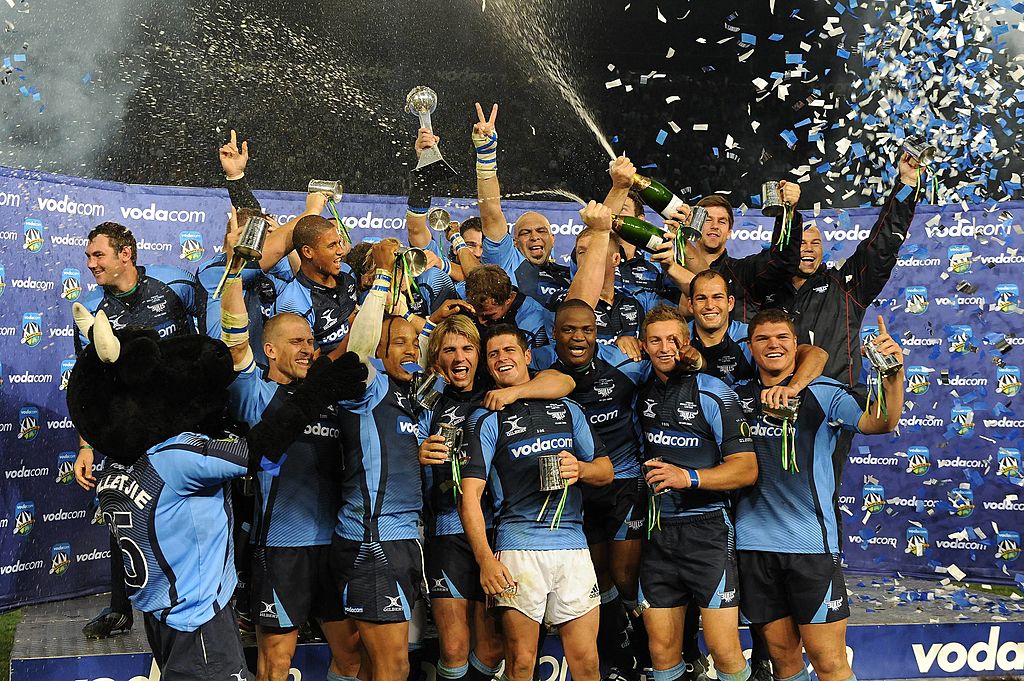
A message to Super Rugby Pacific. South Africa doesn’t want back into your competition. Not now. Not ever.
Super Rugby Pacific CEO Jack Mesley, speaking to Martin Devlin on DSPN, dismissed the idea of South African teams ever returning.
Pressed directly, he said:
“No.”
Asked why he would not welcome South Africa back into the competition, Mesley replied:
“If you go back and look at the data, those games did not rate well. They did not attend well. They did not rate like we’re rating now. They did not attend like we are attending now.”
He added:
“I think there is a romance associated with the South African days.”
Devlin joked:
“It always is about the girlfriend who leaves, mate.”
Mesley laughed and concluded:
“Even a South African one.”
Romance?
Let’s deal in reality.
The Springboks have thrived post Super Rugby’s exit.
Since South Africa shifted north post-Covid and into the United Rugby Championship and Investec Champions Cup, the Springboks have become the dominant force in world rugby.
- Two Rugby World Cups in 2019 and 2023.
- Back-to-back Rugby Championship titles in 2024 and 2025.
- Five wins in their last six Tests against the All Blacks.
- A record 43-10 demolition in Wellington.
- A 35-7 humiliation at Twickenham.
This is more a measurable dominance than it is a sentimental nostalgia.
South African clubs now play in a weekly high-intensity cross-hemisphere competition against Ireland’s provinces, French heavyweights and English power clubs. They play against Welsh, Scottish and Italian teams. The URC and Champions Cup demand travel, adaptability, and confrontation with contrasting styles.
It has hardened South African players tactically and physically.
They are preparing for Test rugby and World Cups. This is not the exhibition of Bledisloe or the basketball of Super Rugby Pacific.
The All Blacks have regressed since South Africa left Super Rugby
New Zealand’s post-Covid Test record tells a different story.
For the first time in the professional era, the All Blacks have looked physically vulnerable. They have been bullied at the collision and they have lost multiple home Tests. They have been beaten consistently by the Springboks.
The annual three-week Super Rugby tours to South Africa once conditioned New Zealand franchises for brutality. Playing the Bulls at Loftus, the Stormers in Cape Town, the Sharks in Durban, and making trips to Bloemfontein and Ellis Park were a weekend physical audit.
That audit no longer exists.
Super Rugby Pacific is now largely an internal New Zealand competition with Australian and Pacific participation. The physical edge that South African teams brought has disappeared.
Eddie Jones, speaking to Devlin, bluntly addressed the decline.
“That’s the other thing that’s changed for New Zealand Rugby; Super Rugby was the greatest influence on world rugby for a long period of time. Whatever happened in Super Rugby basically set the trend for the game.”
He continued:
“Unfortunately, Super Rugby has dropped in terms of status. We all know South Africa has left, and now it’s a competition that doesn’t have as much influence around the world.”
What Jones is articulating is the structural erosion of the competition. Super Rugby, in its original Super 12 guise, had no equal in world rugby’s club environment. Super Rugby Pacific is now an afterthought to competitions like the Investec Champions Cup, the URC, the English Prem and France’s Top 14.
Super Rugby Pacific produces strong local derbies and healthy domestic numbers, but globally, its relevance has shrunk.
The winner is almost invariably a New Zealand side, the style is about attack and little regard for the nuances of Test rugby, especially World Cup rugby, and the buzz word is entertainment, ball in play and no respect for the pressure moments that define World Cup titles.
Test rugby is not exhibition rugby.
When confronted by the Springboks’ power game or France and England’s pack-driven precision, the All Blacks have looked less conditioned for the grind.
South Africa, meanwhile, are conditioned weekly in Europe and then sharpened further in the Rugby Championship.
The Arrogance
New Zealand Rugby previously dismissed South Africa’s contribution to Super Rugby. The outgoing CEO Mark Robinson made clear that the competition would move on without South Africa before even formally informing SA Rugby leadership.
Robinson, an average All Black, has been even more mediocre as NZ Rugby CEO. His reward for cocking it up was to get a job from his Aussie mate (World Rugby Chair) and namesake Brett Robinson, as the Chief of Rugby.
Chief of Rugby? What the Chair means is a portfolio created before appointing Robinson as the CEO of World Rugby.
It is messy, but not as messy as the illusion that Super Rugby Pacific has a global appeal.
SUPER RUGBY PACIFIC CEO MESLEY MOCKS SA RUGBY
Mesley speaks of romance and laughs at the idea of a South African return. Look, he is an Aussie, so that explains a few things.
But to believe he knows rugby is a stretch, despite the purple prose on his appointment.
Super Rugby Pacific Chair Kevin Malloy said Mesley’s strong marketing background and practical skillset made him ideally suited to the Super Rugby Pacific CEO role.
“What set Jack apart from a strong pool of candidates following a thorough search was his passion for rugby, his enthusiasm and a breadth of experience in both marketing and sports,” Malloy said.
OK, if you want to believe that Kev!
These are strange times in New Zealand rugby.
An ex-All Black in Robinson rejuvenated the Springboks in kicking South Africa out of Super Rugby and an Aussie marketer has added to New Zealand’s misery with his promotion of an insular Pacific competition.
The irony in the Republic is that South Africa still respects New Zealand. It is the Test South Africans always want to experience.
The Greatest Rivalry Tour later this year is sold out, within hours of tickets going on sale.
The All Blacks remain rugby’s most recognisable brand in South Africa, and there is no smugness in the Republic when South African rugby people speak of NZ Rugby or the All Blacks. There is only respect and a varying degree of adulation.
Mesley speaks with a smirk about South African romance in Super Rugby, but the South African game has grown stronger on every front since moving north and New Zealand rugby has grown smaller without South Africa.
There is a word in South Africa for dismissive arrogance dressed up as data. There is a word for Mesley.
It starts with a P … and it isn’t Pacific.
International Rugby
England hammer Wales as British media deliver brutal Six Nations verdict
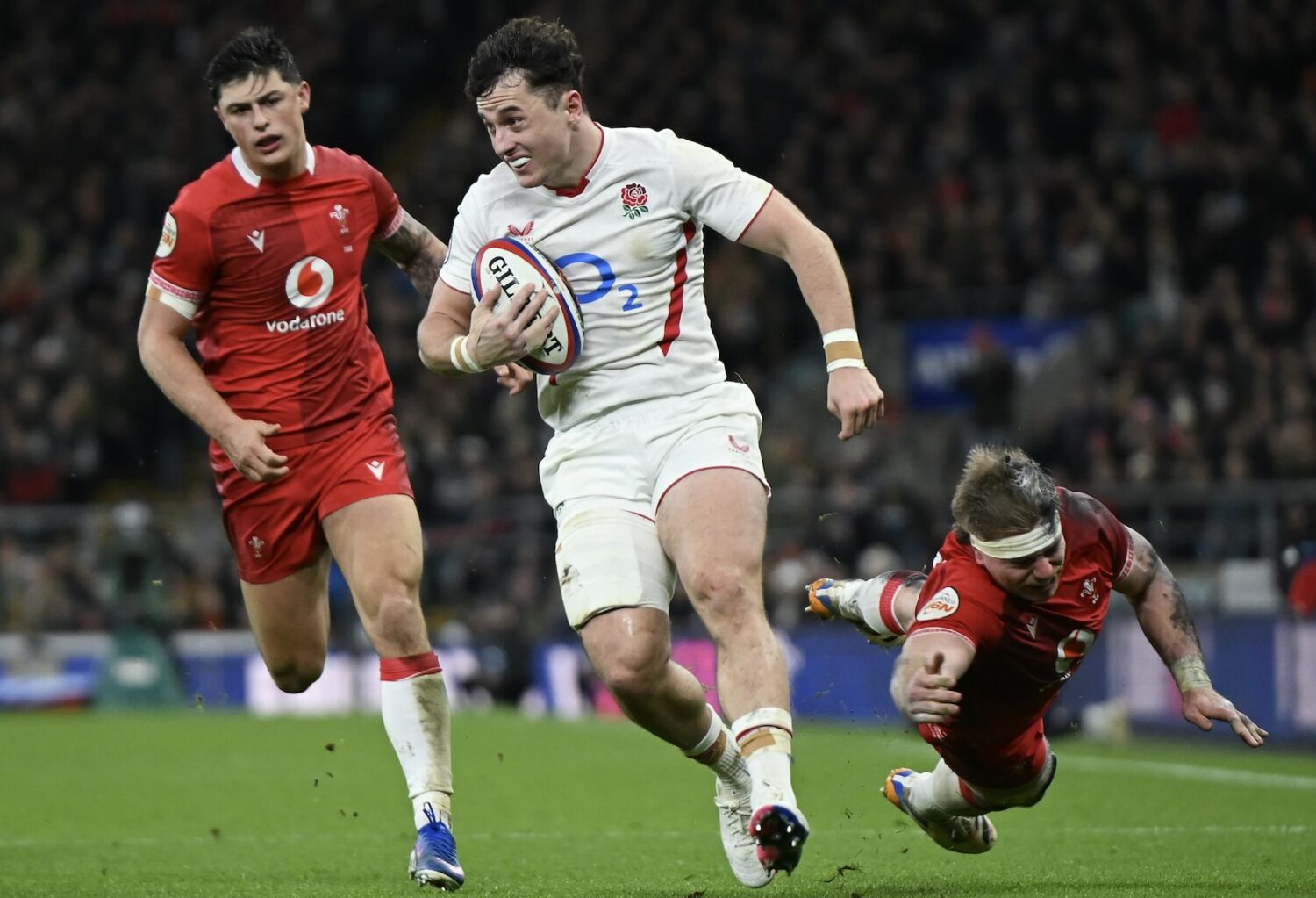
England didn’t just hammer Wales 48-7 at the Allianz Stadium in Twickenham; they reminded the visitors that they will only be good for the wooden spoon in the 2026 Six Nations.
The contest was over before kick-off but confirmed as officially over before the 20th minute when Wales trailed 10-0 and were reduced to 13 players. That score doubled to 22-0 before the 30th minute and it could have been even more damning but for England’s inaccuracy and many poor decisions when playing 15 versus 13.
The British media were ruthless in their assessment of England’s demolition of the Welsh, with the flameless Dragons offering no resistance. Their discipline collapsed, belief vanished, and England didn’t need to be spectacular to be savage.
Henry Arundell scored a hat-trick and No 10 George Ford was voted Player of the Match. Wales’ catastrophic discipline, turned a historic rivalry into a one-sided examination.
Across the UK press, the only argument was about how deep Wales’ problems run.
Planet Rugby
Planet Rugby framed the match as an England statement, focusing on clarity of attack and ruthless punishment of Welsh indiscipline. Their assessment was that England didn’t chase miracles – they simply played what was in front of them and dismantled a side repeatedly reduced by yellow cards.
🔗 https://www.planetrugby.com
RugbyPass
RugbyPass led with England “running riot”, highlighting Arundell’s finishing and Ford’s authority at No 10. The tone was decisive: Wales lost control early and never recovered, leaving England to dictate tempo, territory and scoreboard.
🔗 https://www.rugbypass.com/news/england-stars-run-riot-as-wales-dismantled-in-six-nations-opener/
BBC Sport
BBC Sport focused on England’s composure, stressing how quickly the contest slipped away once Wales started collecting yellow cards. England were praised for discipline and patience – doing nothing spectacular, but everything right.
🔗 https://www.bbc.com/sport/rugby-union
The Guardian
The Guardian called it a resounding win, pointing out England left points on the field while Wales self-destructed. Their report linked the performance to wider Welsh instability, suggesting the problems extend well beyond 80 minutes.
🔗 https://www.theguardian.com/sport/2026/feb/07/england-wales-six-nations-match-report
Rugby365
Rugby365’s reaction was blunt and familiar: ill-discipline killed Wales, England simply obliged. The outcome was decided early, repeated penalties and cards ensuring no route back.
🔗 https://rugby365.com
SA Rugby Magazine
SA Rugby Mag viewed the result through a global lens – England rising, Wales regressing. Less about the score, more about trajectory, with England building momentum in winning for a 12th successive match, and Wales stuck in survival mode.
🔗 https://www.sarugbymag.co.za
Welsh response
Welsh media reaction were more sombre than angry. Discipline, fragility and a lack of physical authority were recurring themes. The concern is no longer about losing to England; it’s about how easily Wales are folding under pressure.
*Italy beat Scotland 18-15 in Saturday’s early game.
HOW THE MEDIA RATED FRANCE BEATING IRELAND 36-14
ALL THE PLAYER AND TEAM STATS FROM ROUND 1 MATCH CENTRE OF THE 2026 SIX NATIONS
International Rugby
How transformed France tortured inept Ireland in Paris
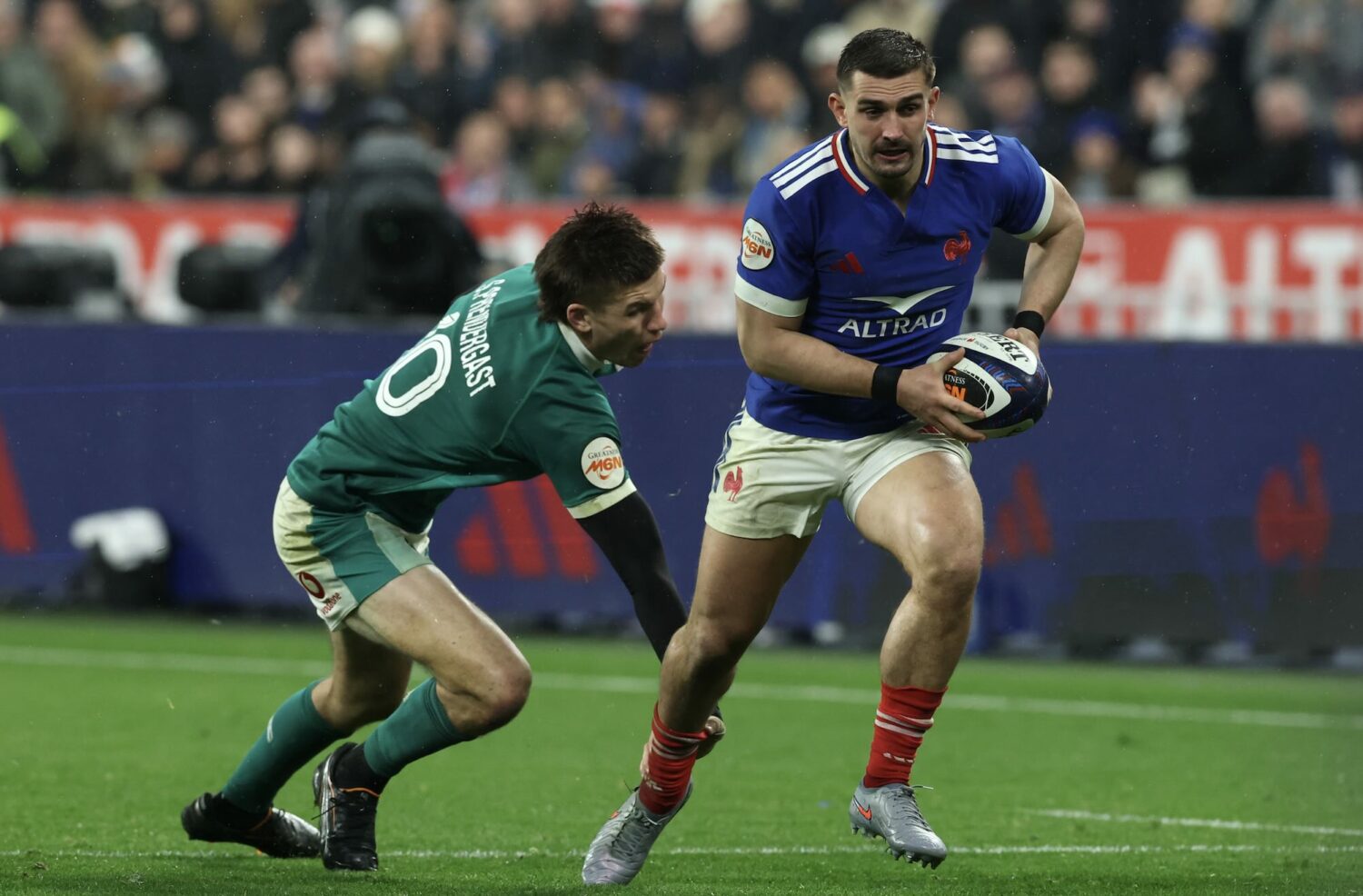
France changed players, approach and tactics to torture Ireland 36-14 in Paris in the Six Nations. We look at the difference between 2026 win and the 2025 win by France against Ireland in Dublin.
Ireland 27 France 42
Six Nations 2026 – Paris
France 36 Ireland 14
Here’s what France did differently.
1) 2026: France dominated the match. 2025: France stole it with efficiency.
Dublin 2025: Ireland had 58% possession and 53% territory, and France still won by 15. France were happy to defend for long stretches (they made 187 tackles) and then punish Ireland when the game fractured.
Paris 2026: France flipped that script. They had 55% possession and 59% territory and played the game mostly in Ireland’s half. That’s not “clinical counterpunching”. That’s control.
The tell: France ran for 588 metres in 2026 vs Ireland’s 385. In 2025 it was basically even (474 vs 477). France went from “equal metres, better strike-rate” to “more ball, more territory, more metres, more everything.”
2) 2026: France carved Ireland open. 2025: France finished better than Ireland.
Clean breaks
-
2025: France 7 clean breaks, Ireland 5 (tight margin).
-
2026: France 19 clean breaks, Ireland 5 (a gulf).
That’s the difference between a game you win and a team you hurt.
3) 2026: France’s pressure forced Irish errors at scale.
Ireland’s “handling under heat” fell apart in Paris:
-
2026 turnover knock-ons: Ireland 11, France 6
-
2025 turnover knock-ons: Ireland 7, France 3
France didn’t just wait for mistakes in 2026. They manufactured them with territory, line-speed, and contestable moments.
4) 2026: Ireland couldn’t tackle France. In 2025 they couldn’t stop France finishing.
-
2025 missed tackles: Ireland 23 (France 16)
-
2026 missed tackles: Ireland 42 (France 21)
That’s not “a few soft shoulders”. That’s structural stress: repeated breaks, repeated reloads, repeated one-on-ones lost.
5) 2026: France won the first hour. 2025: France won the key moments (and the second-half surge).
In Paris, Ireland were 29–0 down before they got going. France had already cashed the bonus point and then eased.
In Dublin, France’s big statement was the second-half blitz, after losing Antoine Dupont early (he went off around the half-hour and later it was confirmed as a cruciate injury).
So:
-
2025: a win built on resilience + clinical finishing after disruption.
-
2026: a win built on front-foot brutality + sustained dominance.
6) The halfback axis changed – and so did the type of threat.
In 2026, with Ntamack out, Jalibert started and had a direct hand in multiple tries, while Dupont called their connection “very positive.”
That matters tactically: Jalibert tends to play flatter and more visibly, and France’s attack in 2026 looked like a team choosing to rip you open in-phase, not just punish you when you overplay.
The simplest summary
Dublin 2025: France were ruthless in chaos – even while defending for long spells.
Paris 2026: France were ruthless in control – more territory, more breaks, more metres, and Ireland cracked.
This is where the regression is most obvious – and most damaging.
1) Physical dominance at the contact point
Ireland’s biggest slide is brutally simple: they are no longer winning collisions consistently.
Against France in Paris, Ireland were regularly knocked backwards in contact, which killed their ability to play fast, accurate phase rugby. Once that happens, everything else collapses – tempo, shape, decision-making.
A season earlier in Dublin, Ireland could still absorb France’s power and recycle quickly. In 2026, France dictated the gainline on both sides of the ball and Ireland were playing from behind bodies instead of on top of them.
This is the clearest regression because Ireland’s entire system is built on fast ruck ball. Take that away and the system has no oxygen.
2) Defensive resilience under sustained pressure
Ireland used to bend without breaking. They now bend, fracture, and then leak tries.
The missed-tackle spike in Paris wasn’t about effort – it was about:
-
repeated reloads
-
fatigued edge defenders
-
centres and back-three players making late, reactive reads
In Dublin 2025, Ireland could survive France’s big moments and reset. In Paris 2026, once France scored early, Ireland never regained defensive authority. The scoreline at halftime wasn’t a fluke it was the logical outcome of structural stress.
3) Attacking clarity without Johnny Sexton
This is not about nostalgia – it’s about control.
Ireland have regressed in:
-
in-game management
-
territory selection
-
when to slow down a match
In Paris, Ireland chased the game far too early, forcing passes under pressure instead of building pressure. Sexton’s absence isn’t about individual brilliance – it’s about knowing when not to play.
Ireland still have quality decision-makers, but they don’t yet have a single, dominant conductor who can steady the ship when momentum is gone.
4) Backline punch against elite defences
Ireland’s backs no longer frighten top-tier defences the way they did in 2022–2024.
Against France:
-
line breaks were rare
-
defenders were not fixed
-
edge space was never clean
France could defend honestly and aggressively, without having to overfold or gamble. That is a massive red flag.
A year ago, Ireland could create indecision. In Paris, France defended with certainty.
5) Psychological authority
This is subtle – but it matters.
Ireland used to walk onto the field believing they could impose themselves on anyone. In Paris, once France landed early blows, Ireland looked like a team hoping the storm would pass rather than one capable of changing the weather.
The best Ireland sides of recent years could absorb momentum swings and reassert control. This version struggled to do either.
The uncomfortable truth
Ireland haven’t fallen off a cliff – but they have slipped off a plateau.
They are no longer physically dominant, tactically inevitable, or psychologically imposing against the very best.
FRANCE 36 IRELAND 14: EVERY PLAYER AND TEAM STAT
AFRICA PICKS: YOUR BEST MONEY-MAKING SIX NATIONS BETS
*CHAT supported
International Rugby
Fiery French applauded as alarm bells ring for Ireland
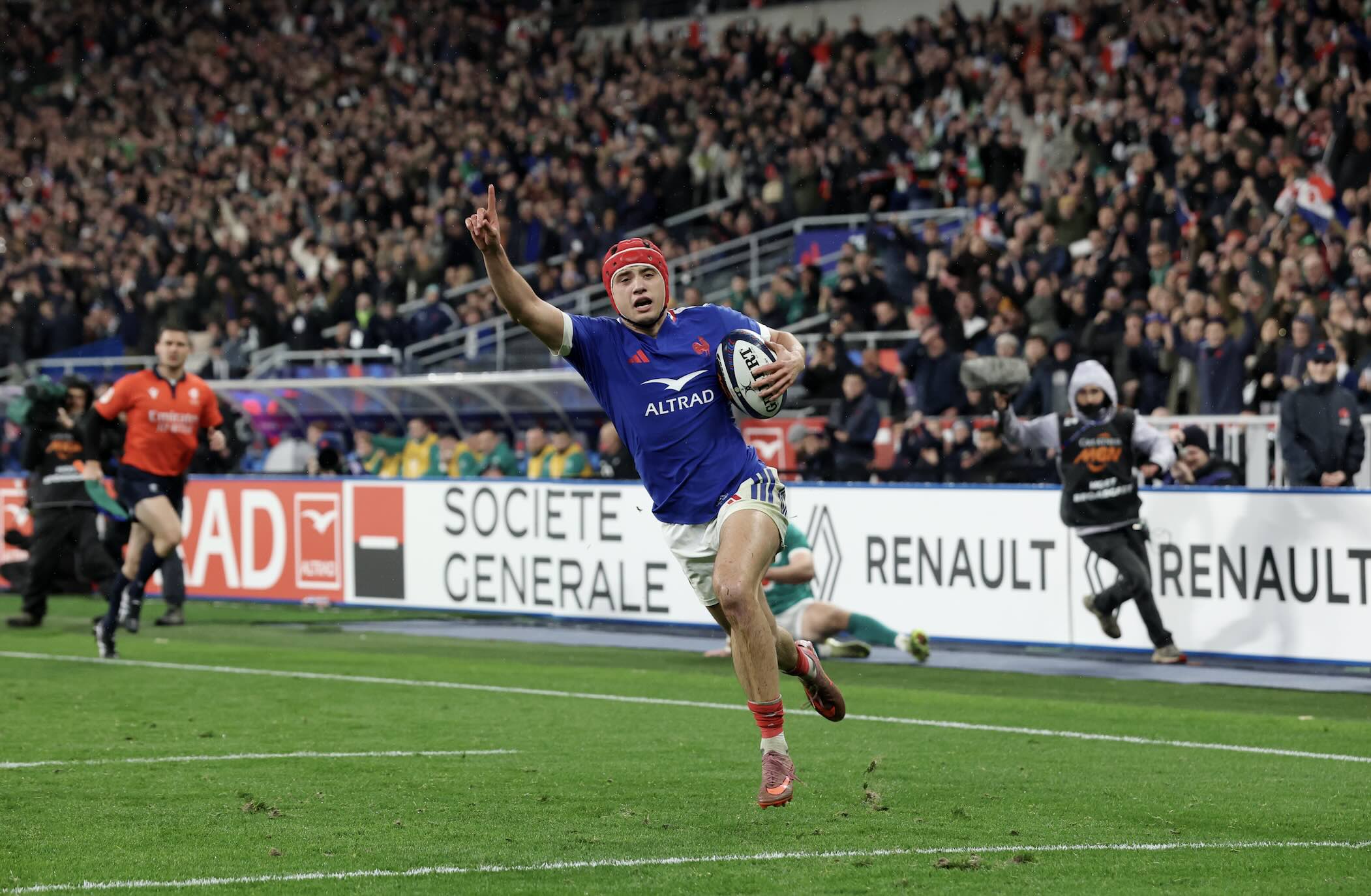
Conviction in the performance, but caution in the storytelling summarised the French media reaction to their brutal 36-14 Six Nations win against Ireland Paris. For the Irish, it was a case of alarm bells ringing.
France had destroyed the Irish in Dublin 42-27 a season ago having led 42-15 with 10 minutes to play. Two late tries added some comfort for Irish supporters. Then came the defeat to the All Blacks in Chicago and the humiliation against the Springboks in Dublin.
Paris was equally damning for Ireland as they were steamrolled.
France led 22 nil at half time and 29 nil after 57 minutes.
Two Irish tries between the 60th and 65th minutes offered more caution to France than hope to Ireland and the hosts finished the final five minutes attacking the Irish try line before crossing for their fifth try.
France are the bookies’ favourites to defend the Six Nations title won last season.
I asked my mate at ChatGPT to do a round up of how the Irish and French Rugby Media reacted to the match.
The Irish Times
Tone: bruised realism.
Summary: framed it as a throwback “Parisian beating” and a reminder of “bad old days” patterns, with Ireland blown away early and left trying to salvage dignity late.
Irish Independent
Tone: alarm bells, big-picture worry.
Summary: leaned into “new reality” language: Ireland didn’t lose a classic, they lost a mismatch, and the margin could have been uglier without the late rally.
Irish Examiner
Tone: sharp critique of Ireland, plus the French pace-setter angle.
Summary: sold it as France starting and finishing with a flourish while Ireland were “abject” for too long; a fast French start “filleted” Ireland before the game ever became a contest.
The Times
Tone: statement win, title warning shot.
Summary: framed it as France sending a message to the championship, with the emphasis on the bonus-point dominance, the early avalanche to 29–0, and Ireland being outmuscled and out-thought until the contest was gone.
L’Équipe (“Le Quippe”)
Tone: controlled praise with a small caution.
Summary: credited a brilliant, accurate French first-half and “seductive” spell, then noted France were less sovereign after the break when they conceded two tries that slightly stained the overall polish.
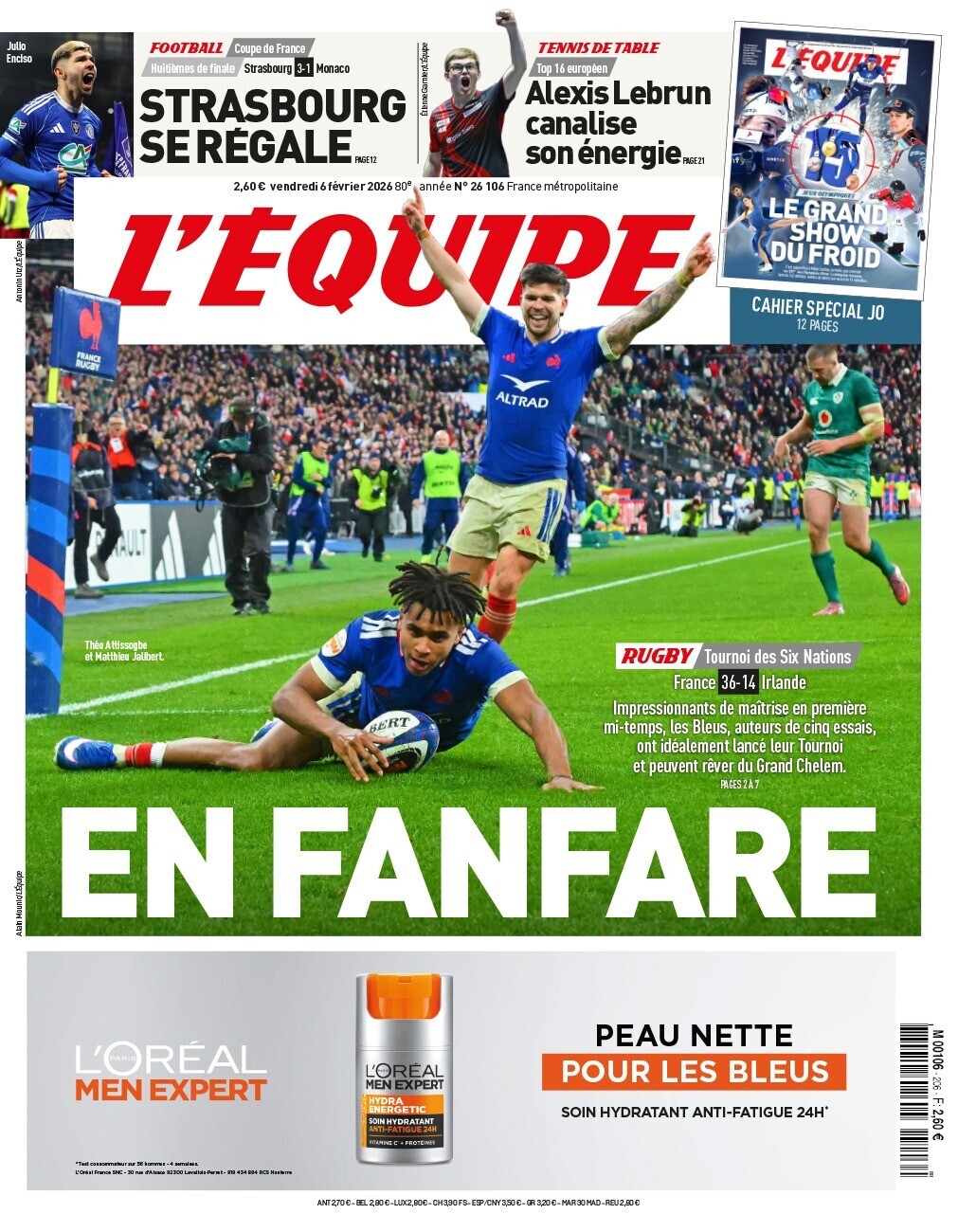
Rugbyrama
Tone: France’s tempo and discipline as the headline.
Summary: stressed how France’s pace exhausted Ireland, how clean the first-half was (discipline/accuracy), then pointed out Ireland only found daylight when France dropped intensity after building the lead.
SA Rugby Magazine
Tone: acknowledgement of quality and statement intent.
SA RugbyMag’s headlines framed the result as France making a statement in their Six Nations title defence, highlighting coach Fabien Galthié’s praise of France’s attacking display in Paris. The emphasis was on the dominance and intent shown by the defending champions rather than harsh analysis of Ireland’s shortcomings.
Rugby365
Tone: bold and definitive.
Rugby365 was unequivocal: France “made a statement” in this opener, labelling the performance a demolition job on one of the Six Nations’ traditional heavyweights. Their report leaned into the idea that France weren’t just winning they were announcing their intentions for the tournament from the first whistle.
Planet Rugby (South African audience perspective)
Tone: tactical and analytical.
Planet Rugby’s reaction, widely read by South African fans, focused on key takeaways from the match: France’s first-half masterclass, sharp player ratings (with Sam Prendergast singled out as struggling for Ireland), and how the French backs and playmakers ran the Irish defence ragged. They combined phrase-by-phrase insights with ratings and analytic angles rather than pure storytelling.
Overall SA reaction themes
South African rugby media weren’t interested in gentle language and they saw France’s dominance as clear and meaningful:
-
Statement performance: France announcing themselves as early title favourites.
-
Clinical attacking rugby: emphasis on the French backs and strategic intensity that pushed Ireland on the back foot.
-
Confirmation of expectations: the result was consistent with pre-match previews and broader Six Nations narratives.
International Rugby
Dupont gives France flex as Ireland face Paris power test
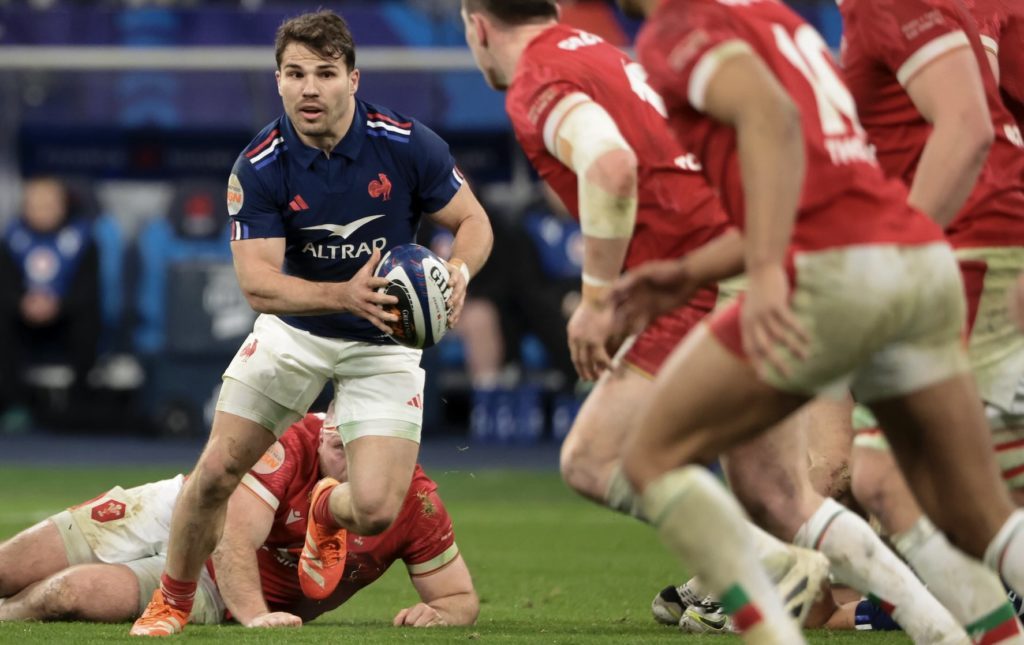
Antoine Dupont is the flex in a fantastic French match 23 that will be too powerful for Ireland in Paris in the Six Nations season opener.
Dupont alters the physics of the contest, and he adds an extra layer of muscle, authority and inevitability to a side already designed to win Test matches through force. His long injury absence is irrelevant now. What matters is what he brings back with him, and that is control, collision dominance and an edge.
Dupont is the best scrumhalf in the world and he he is the national team’s talisman.
But it is up front where all the work will be done for Dupont to play conductor. France’s selection confirm intent and physicality. It is a pack chosen for confrontation.
Jean-Baptiste Gros, Julien Marchand and Dorian Aldegheri are a front row built to scrum, carry and squeeze the life out of opponents, while locks Charles Ollivon and Mickaël Guillard bring physical presence, aerial dominance and edge in the tight exchanges. The back row of François Cros, Oscar Jegou and Anthony Jelonch are physically relentless and they feed off collisions.
This is a French pack that creates the tempo and then Dupont determines the range of this tempo.
Ireland’s pack has peaked and France coach Fabian Galthie would have studied their capitulation to world champions South Africa in Dublin last November. The Boks destroyed Ireland in the scrums and the collisions.
Props Thomas Clarkson and Jeremy Loughman face an enormous examination against Gros and Aldegheri, and if Ireland concede scrum dominance, their entire game model collapses because it is built on control, rhythm and precision rather than chaos.
The French halfback pairing only amplifies that threat. Matthieu Jalibert plays flatter and faster than the Ireland flyhalves of recent seasons, and Dupont’s presence ensures defenders are constantly torn between folding around the ruck or drifting early, a dilemma that France exploit ruthlessly.
Ireland’s continued struggle to replace the authority and game management of Johnny Sexton remains an issue. Sam Prendergast is a talent, but opening a Six Nations campaign in Paris against this French pack is a brutal assignment, and he will be targeted physically and mentally.
ALL THE 2026 SIX NATIONS FIXTURES
The Irish backline, stripped of key personnel, looks noticeably less imposing as a unit. Without Hugo Keenan at fullback, without the aerial pressure and edge of Mack Hansen and James Lowe on the wings, and without the direct power of Bundee Aki at inside centre, Ireland lack the punch that previously allowed them to play beyond the gain line.
France, by contrast, look balanced and settled, with Thomas Ramos offering control and goal-kicking, Louis Bielle-Biarrey providing genuine pace, and Jalibert bringing attacking ambition, supported by centres and wings comfortable in a collision-heavy Test.
Add the significance of the Stade de France on opening night, where French energy multiplies and visiting teams feel pressure accumulate with every lost carry and every retreating scrum, and the advantage tilts decisively towards the hosts. When France dominate the gain line and Dupont starts probing around fatigued forwards, Ireland will be forced to chase a game they are no longer structurally equipped to chase.
This is not about flair or reputation, it is about force, physical authority and control, and France hold the upper hand in the pack, at scrumhalf, off the bench and in the stands.
Just as they did in last season’s match-up in Dublin, which they won comfortably 42-27, having led 42-15 with five minutes to play.
AFRICA PICKS: ALL YOU NEED TO KNOW FOR YOUR FRANCE V IRELAND BETTING
My call: France 33 Ireland 22.
International Rugby
URC ROUND 11 – ALL YOU NEED TO KNOW
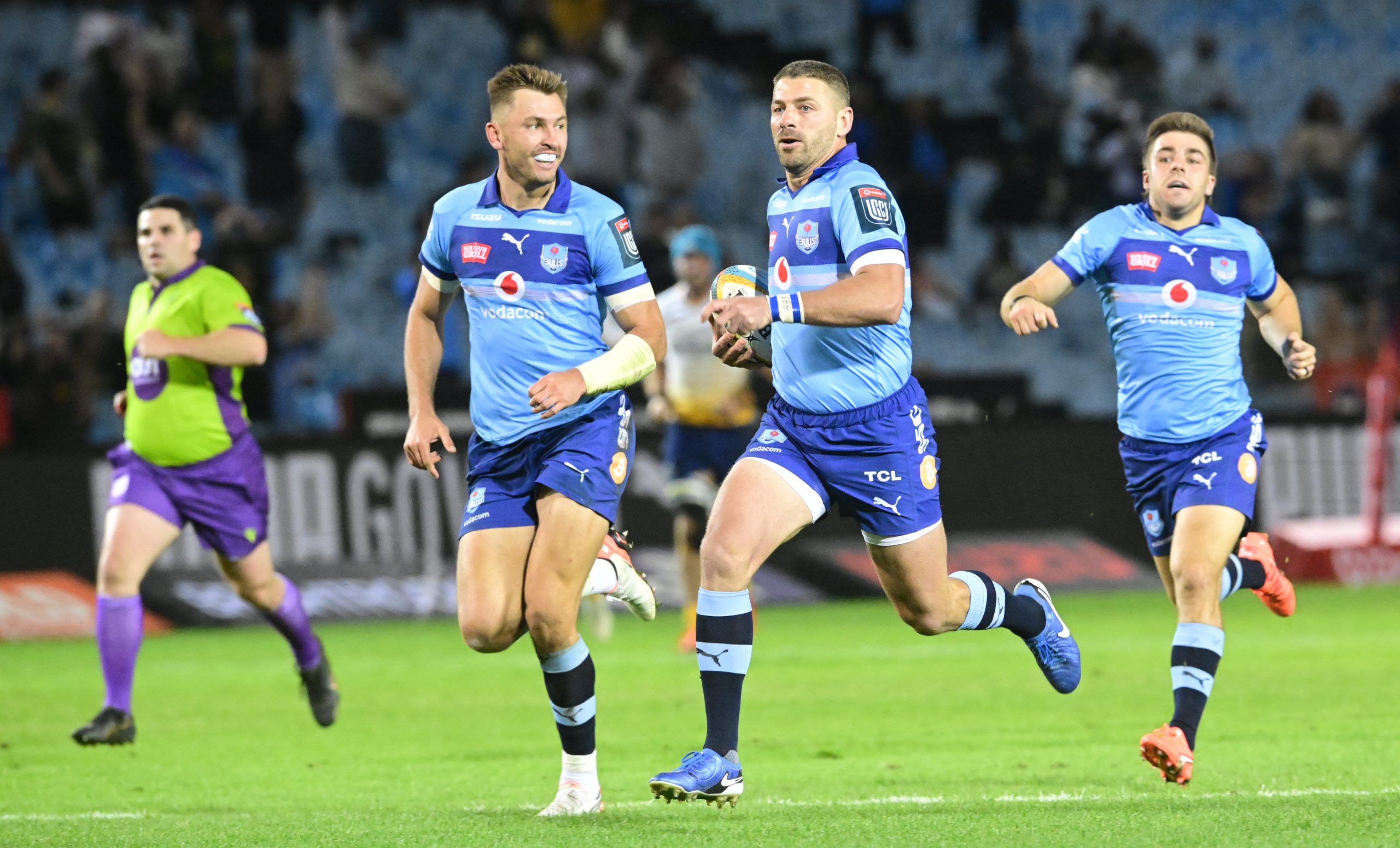
The Sharks host the Stormers in one of two South African URC derbies to end the first half of the league season. The Lions are at home to the Bulls in the northern derby. Here’s everything you need to know for the weekend’s Round 11 showdowns.
The South African teams have all chosen the best available squads in the last Saturday of the month and the last Saturday of URC action until the league resumes in the last weekend of February.
The Six Nations takes priority in February, with the first three rounds played before the URC starts up again for the last eight league matches and the play-offs.
The Stormers, beaten for the first time in the league last Saturday, get the chance of redemption in Durban. It was the Sharks who beat them in Cape Town. The same is true of the Lions and Bulls derby. The Lions earlier in the league, won at Loftus Versfeld in Pretoria.
Several of the Northern Hemisphere clubs are severely understrength for Round 11, as the leading current internationals have been in camp with their respective national teams preparing for next weekend’s Six Nations opening round.
It makes for a punter’s nightmare in these matches because the form guide is not a measurement with so many frontline players missing.
WATCH: KEO & ZELS ON SHARKS, STORMERS, LIONS & BULLS
AFRICA PICKS RUGBY: Keo calls the South African derbies
|
#BENvSCA
#GLAvMUN
#LIOvBUL
#SHAvSTO
#ZEBvCON
#LEIvEDI
#OSPvDRA
#ULSvCAR
|
|
FRIDAY, JANUARY 30 Benetton v Scarlets Stadio Monigo, Treviso – KO 19.45 IRE & UK / 20.45 ITA / 21.45 SA Referee: Andrew Brace (IRFU, 113th league game) AR 1: Clara Munarini (FIR) AR 2: Bisetto Luca (FIR) TMO: Olly Hodges (IRFU) Live on: Sky Italia, S4C, Premier Sports, SuperSport, Flo Rugby & URC.tv Benetton: Rhyno Smith, Ignacio Mendy, Paolo Odogwu, Malakai Fekitoa, Onisi Ratave, Nicolas Roger Farias, Andy Uren (CAPT), Thomas Gallo, Siua Maile, Marcos Gallorini, Giulio Marini, Eli Snyman, Alessandro Izekor, Jadin Kingi, So’otala Fa’aso’o Replacements: Bautista Bernasconi, Destiny Aminu, Tiziano Pasquali, Scott Scrafton, Nelson Casartelli, Alessandro Garbisi, Matt Gallagher, Filippo Drago
Scarlets: Jac Davies, Macs Page, Joe Roberts, Johnny Williams (CAPT), Tomi Lewis; Carwyn Leggatt-Jones, Gareth Davies, Alec Hepburn, Marnus van der Merwe, Archer Holz, Jac Price, Sam Lousi, Max Douglas, Jarrod Taylor, Fletcher Anderson Replacements: Harry Thomas, Josh Morse, Henry Thomas, Jake Ball, Dan Davis, Dane Blacker, Billy McBryde, Iori Badham Benetton Head Coach Calum MacRae said: “Scarlets are one of the Vodacom URC teams that uses the kicking game the most and builds their opportunities through territorial control. The aerial game is an area we definitely need to improve”
Scarlets Interim Director of Rugby Nigel Davies said: “We have looked at these Vodacom URC games, Ulster and Benetton, as a two-game series and it’s important we back up last weekend’s win – we’ve done the first bit, now our focus is on another massive game. “Benetton have recruited well, are coached well and play a good brand of rugby. Like us, they have players missing but will still be very strong. We have selected a side with a lot of talented young players who I am excited to see step up to the challenge on Friday night.” Glasgow Warriors v Munster Rugby Scotstoun Stadium, Glasgow – KO 19.45 IRE & UK / 20.45 ITA / 21.45 SA Referee: Craig Evans (WRU, 72nd league game) AR 1: Ian Kenny (SRU) AR 2: David Sutherland (SRU) TMO: Adam Jones (WRU) Live on: Premier Sports, TG4, SuperSport, Flo Rugby & URC.tv Glasgow Warriors: Josh McKay, Kyle Rowe, Stafford McDowall (CAPT), Kerr Yule, Ollie Smith, Dan Lancaster, Ben Afshar, Jamie Bhatti, Seb Stephen, Murphy Walker, Alex Craig, Jare Oguntibeju, Euan Ferrie, Angus Fraser, Ally Miller Replacements: Grant Stewart, Nathan McBeth, Sam Talakai, Dylan Cockburn, Sione Vailanu, Macenzzie Duncan, Jack Oliver, Matthew Urwin
Munster Rugby: Mike Haley, Thaakir Abrahams, Shane Daly, Dan Kelly, Diarmuid Kilgallen, Tony Butler, Ethan Coughlan, Josh Wycherley, Diarmuid Barron (CAPT), Oli Jager, Evan O’Connell, Fineen Wycherley, Seán Edogbo, Ruadhán Quinn, Brian Gleeson Replacements: Lee Barron, Mark Donnelly, John Ryan, Gavin Coombes, Jack O’Donoghue, Paddy Patterson, Tom Wood, Seán O’Brien Glasgow Warriors Head Coach Franco Smith said: “We are looking forward to seeing our full squad involved this weekend, with everyone eager to finish this block in the right manner.”
“Munster are a proud club with a strong heritage of challenging across all competitions – they will be pushing for the top four once again this season and will bring a strong, physical challenge tomorrow night. “Everyone is looking forward to the test that lies ahead, and running out in front of what’s set to be another sold out Scotstoun.”
|
| SATURDAY, JANUARY 31
Lions v Vodacom Bulls Ellis Park, Johannesburg – KO 12.30 IRE & UK / 13.30 ITA / 14.30 SA Referee: Morne Ferreira (SARU, 20th league game) AR 1: Hanru van Rooyen (SARU) AR 2: Sean Muller (SARU) TMO: Egon Seconds (SARU) Live on: SuperSport, Premier Sports, Flo Rugby & URC.tv Lions: Quan Horn, Angelo Davids, Henco van Wyk, Bronson Mills, Richard Kriel, Chris Smith, Morne van den Berg, SJ Kotze, PJ Botha, Asenathi Ntlabakanye, Ruben Schoeman, Reinhard Nothnagel, Jarod Cairns, Batho Hlekani, Francke Horn (CAPT) Replacements: Morne Brandon, RF Schoeman, Conraad van Vuuren, Etienne Oosthuizen, Darrien Landsberg, Renzo du Plessis, Haashim Pead, Erich Cronje Vodacom Bulls: Devon Williams, Stravino Jacobs, Stedman Gans, Harold Vorster, Kurt-Lee Arendse, Handre Pollard, Embrose Papier, Jan-Hendrik Wessels, Johan Grobbelaar, Wilco Louw, Ruan Vermaak, Reinhardt Ludwig, Marcell Coetzee (CAPT), Elrich Louw, Jeandre Rudolph Replacements: Marco van Staden, Alu Tshakweni, Mornay Smith, Cobus Wiese, Mpilo Gumede, Nizaam Carr, Keagan Johannes, David Kriel Vodacom Bulls Head Coach Johan Ackermann said: “The DNA of the Lions of being a running team is still there, so I expect them to play a fast game at Ellis Park because it was always one of our go-to strategies when I coached there. I think it will be an entertaining game.” ANDRE THE GIANT SLAUGHTERS STORMERS IN CAPE TOWN Hollywoodbets Sharks v DHL Stormers Hollywoodbets Kings Park, Durban – KO 15.00 IRE & UK / 16.00 ITA / 17.00 SA Referee: Christopher Allison (SARU, 7th league game) AR 1: Griffin Colby (SARU) AR 2: Jonathan Lottering (SARU) TMO: Quinton Immelman (SARU) Live on: SuperSport, Premier Sports, Flo Rugby & URC.tv Hollywoodbets Sharks: Aphelele Fassi, Edwill van der Merwe, Ethan Hooker, Andre Esterhuizen (CAPT), Jaco Williams, Jordan Hendrikse, Grant Williams, Ox Nche, Fez Mbatha, Hanro Jacobs, Corne Rahl, Emile van Heerden, Siya Kolisi, Vincent Tshituka, Phepsi Buthelezi Replacements: Eduan Swart, Phatu Ganyane, Vincent Koch, Jason Jenkins, Nick Hatton, Jaden Hendrikse, Siya Masuku, Jurenzo Julius DHL Stormers: Damian Willemse, Dylan Maart, Wandisile Simelane, Jonathan Roche, Leolin Zas, Sacha Feinberg-Mngomezulu (CAPT), Cobus Reinach, Oli Kebble, André-Hugo Venter, Neethling Fouché, Adré Smith, Ruben van Heerden, Paul de Villiers, Ben-Jason Dixon, Evan Roos Replacements: JJ Kotzé, Ntuthuko Mchunu, Zachary Porthen, JD Schickerling, Marcel Theunissen, Stefan Ungerer, Jurie Matthee, Warrick Gelant Zebre Parma v Connacht Rugby Stadio Lanfranchi, Parma – KO 15.00 IRE & UK / 16.00 ITA / 17.00 SA Referee: Ben Whitehouse (WRU, 113th league game) AR 1: Fillipo Russo (FIR) AR 2: Lorenzo Pedezzi (FIR) TMO: Keith David (WRU) Live on: Sky Italia, TG4, Premier Sports, SuperSport, Flo Rugby & URC.tv Zebre Parma: Giovanni Montemauri, Mirko Belloni, Giulio Bertaccini, Marco Zanon, Simone Gesi, Martin Roger Farias, Gonzalo Garcia, Paolo Buonfiglio, Giampietro Ribaldi, Enrique Pieretto, Matteo Canali, Leonard Krumov (CAPT), Giacomo Ferrari, Iacopo Bianchi, Davide Ruggeri Replacements: Shilo Klein, Luca Franceschetto, Juan Pitinari, Franco Carrera, Alessandro Ortombina, Thomas Dominguez, Enrico Lucchin, Bautista Stavile Connacht Rugby: Sam Gilbert, Shane Jennings, Harry West, Cathal Forde, Chay Mullins, Josh Ioane, Caolin Blade, Jordan Duggan, Dylan Tierney-Martin, Jack Aungier, Josh Murphy, Joe Joyce, Paul Boyle (CAPT), Sean O’Brien, Sean Jansen Replacements: Matthew Victory, Peter Dooley, Fiachna Barrett, David O’Connor, Niall Murray, Ben Murphy, Sean Naughton, Oisín McCormack Connacht Rugby Head Coach Stuart Lancaster said: “We were all gutted not to win last week on such a special night for the club, but we’ve had to quickly move on. The same amount of points are on offer this weekend and we know a win will keep us in the hunt for a playoff spot. We’re obviously missing the lads away on Ireland duty but overall, we’ve been able to keep selection relatively consistent these last few weeks, particularly in the backs. It’s been a long stretch of games, but we’ll do everything we can to finish it on a high and hopefully head into the next block of games with a spring in our step.”
Leinster Rugby v Edinburgh Rugby Aviva Stadium, Dublin – KO 17.30 IRE & UK / 18.30 ITA / 19.30 SA Referee: Andrea Piardi (FIR, 59th league game) AR 1: Eoghan Cross (IRFU) AR 2: Shane Gaughan (IRFU) TMO: Matteo Liperini (FIR) Live on: Premier Sports, SuperSport, Flo Rugby & URC.tv Leinster Rugby: Andrew Osborne, Joshua Kenny, Rieko Ioane, Ciarán Mangan, Ruben Moloney, Charlie Tector, Luke McGrath (CAPT), Jerry Cahir, John Mckee, Andrew Sparrow, RG Snyman, Brian Deeny, Max Deegan, Scott Penny, Diarmuid Mangan Replacements: Gus McCarthy, Alex Usanov, Niall Smyth, Conor O’Tighearnaigh, Josh Ericson, Will Connors, Fintan Gunne, Hugo McLaughlin
Edinburgh Rugby: Harry Paterson, Malelili Satala, Wes Goosen, James Lang, Duhan van der Merwe, Ross Thompson, Ben Vellacott; Boan Venter, Jerry Blyth-Lafferty, Paul Hill, Callum Hunter-Hill, Glen Young, Ben Muncaster, Freddy Douglas, Magnus Bradbury (CAPT) Replacements: Harri Morris, Mikey Jones, Ollie Blyth-Lafferty, Tom Dodd, Connor Boyle, Charlie Shiel, Cammy Scott, Piers O’Conor Leinster Rugby Assistant Coach Robin McBryde said: “Edinburgh are a pretty cohesive bunch. I think they’ll be hurting after their result last weekend. They’ll be keen to finish this block on a high as well. It’s always good to finish on a victory before any sort of break because the result sits with you. So it’ll be tough enough. We’ve just got to improve on certain aspects of the game from last Saturday and really knuckle down.” Edinburgh Rugby Head Coach Sean Everitt said: “Going away to Leinster is one of the toughest tests in the Vodacom URC, but it’s a challenge we’re ready to embrace – we’re going over there to have a real crack at it. “Magnus [Bradbury] resumes the captaincy and his experience in these big away fixtures is invaluable for the group. “We know exactly what we are capable of when we put it all together. The key for us this week is a complete 80-minute performance to get the result we want.” Ospreys v Dragons RFC Electric Brewery Field, Bridgend – KO 19.45 IRE & UK / 20.45 ITA / 21.45 SA Referee: Ben Connor (WRU, 7th league game) AR 1: Ben Breakspear (WRU) AR 2: Carwyn Sion (WRU) TMO: Jenny Davies (WRU) Live on: S4C, Premier Sports, SuperSport, Flo Rugby & URC.tv Ospreys: Iestyn Hopkins, Dan Kasende, Phil Cokanasiga, Keiran Williams, Keelan Giles, Jack Walsh (C.CAPT), Reuben Morgan-Williams, Gareth Thomas, Sam Parry (C.CAPT), Tom Botha, James Fender, Ryan Smith, James Ratti, Ross Moriarty, Morgan Morse Replacements: Lewis Lloyd, Steffan Thomas, Rhys Henry, Marco de Witt, Gwilym Evans, Cormac Foley, Max Nagy, Harri Houston Dragons RFC: Angus O’Brien (CAPT), David Richards, Fine Inisi, Aneurin Owen, Rio Dyer, Tinus de Beer, Che Hope, Wyn Jones, Brodie Coghlan, Robert Hunt, Levi Douglas, Seb Davies, Ryan Woodman, Harry Beddall, Harri Keddie Replacements: Oli Burrows, Jordan Morris, Cebo Dlamini, Shane Lewis-Hughes, Evan Minto, Rhodri Williams, Fetuli Paea, Cai Evans Dragons RFC Coach Dale MacLeod said: “Ospreys will be tough. They are a team with a big forward pack, they general start well and are tough to beat at home. “It’s exciting that all four Welsh teams are starting to put some performances together, through all the emotion going on. “They’ll be two good teams playing, I don’t think there will be much in it, and it will be about who holds their head, stays in the game, and owns the little moments. “We’re looking forward to it, they will be too, so it’s going to be a massive challenge.” Ulster Rugby v Cardiff Rugby Affidea Stadium, Belfast – KO 19.45 IRE & UK / 20.45 ITA / 21.45 SA Referee: Hollie Davidson (SRU, 26th league game) AR 1: Robbie Jenkinson (IRFU) AR 2: Sam Holt (IRFU) TMO: Mike Adamson (SRU) Live on: Premier Sports, SuperSport, Flo Rugby & URC.tv Ulster Rugby: Ethan McIlroy, Werner Kok, James Hume, Ben Carson, Zac Ward, Jack Murphy, Conor McKee, Angus Bell, Rob Herring, Scott Wilson, Iain Henderson (CAPT), Charlie Irvine, Matthew Dalton, Marcus Rea, David McCann Replacements: James McCormick, Sam Crean, Bryan O’Connor Harry Sheridan, Lorcan McLoughlin, David Shanahan, Jake Flannery, Ben Moxham Cardiff Rugby: Cam Winnett, Ioan Lloyd, Harri Millard, Steffan Emanuel, Tom Bowen, Callum Sheedy, Johan Mulder, Rhys Barratt, Evan Lloyd, Javan Sebastian, Josh McNally (CAPT), George Nott, Alun Lawrence, Dan Thomas, Taine Basham Replacements: Daf Hughes, Danny Southworth, Joe Cowell, Rory Thornton, Lucas de la Rua, Aled Davies, Elijah Evans, Leigh Halfpenny Cardiff Rugby Coach Corniel van Zyl said: “There’s a real excitement about going up to Belfast and putting in a good performance. That’s been the big aim for the week. “Like every club at this stage of the season, we’re in the same boat. We are missing players to the international game, and it tests our squad. But it is an opportunity and that’s how we’re treating it. “What we’ve seen from Ulster is a team that’s very good at keeping the ball in hand and moving the point of contact. We’ll have to be very good defensively to stay in front of them and keep them out. “They’re very potent in the 22. They’re probably one of the top teams for points scored per entry, so we’ll have to be smart around that.” |
International Rugby
Brilliant Bordeaux bulldoze bewildered Bulls
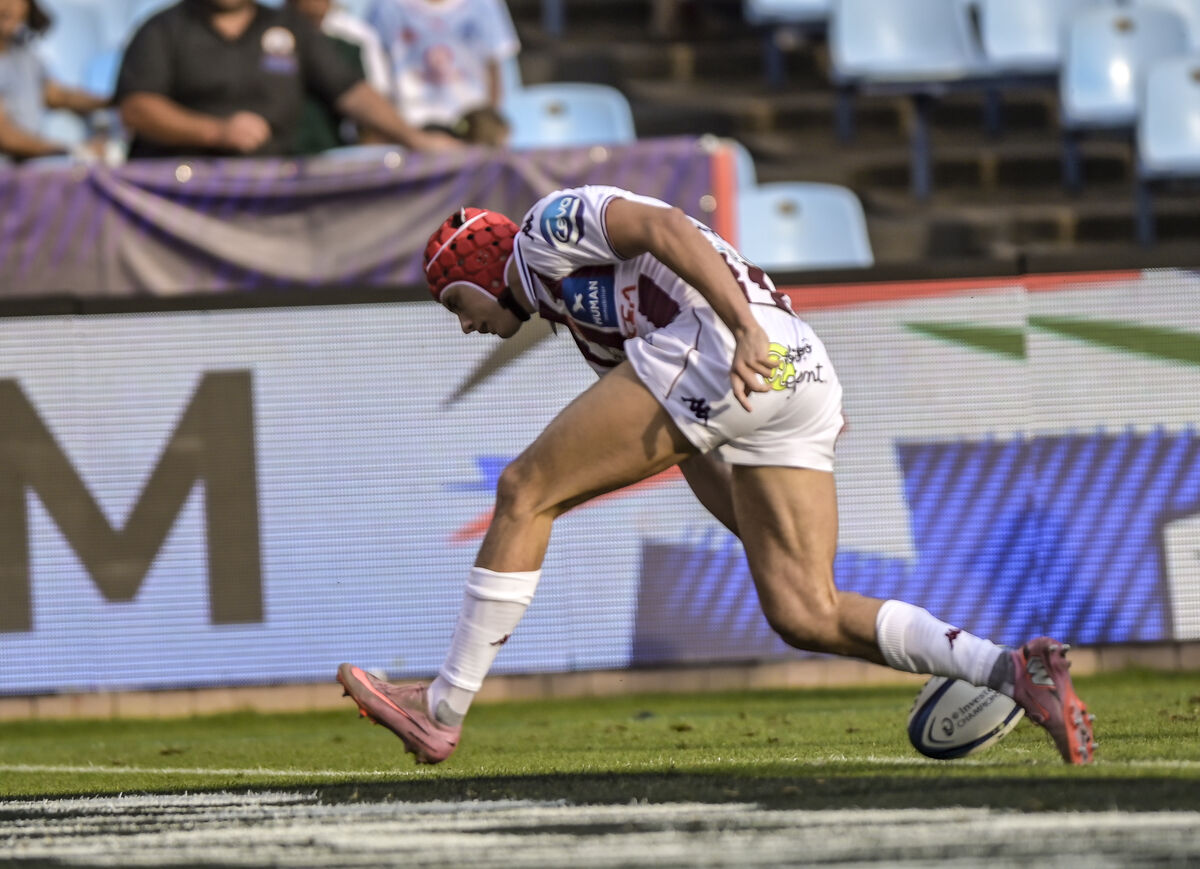
Bordeaux arrived at Loftus as reigning Investec Champions Cup winners and played like a side intent on keeping the crown. The French giants dismantled a disjointed Bulls outfit 46-33, producing a display that was composed, ruthless and dripping with international class, writes Mark Keohane.
And yes – the Bulls somehow led 33-22 at halftime.
The hosts scored five tries in 40 minutes yet never looked in control. The scoreboard offered false comfort and little else.
Bordeaux’s rhythm, tempo and accuracy suggested they were always the side dictating the contest, even when chasing the game.
Bordeaux travelled with 16 internationals in their match-day squad and their stars delivered. With Maxime Lucu and Matthieu Jalibert running the game like seasoned Test generals, and with Damian Penaud and Louis Bielle-Biarrey finishing with the brutality expected of world-class wings, the Pretoria crowd saw the gulf between elite European champions and a South African side still searching for cohesion.
It was breathless early on.
Bordeaux were seven points clear inside three minutes. The Bulls replied, faltered, struck back again, conceded again, and then surged with three late first-half tries. It looked dramatic on paper, but on the field the French were calmer, more accurate and operating with a clarity the Bulls could not match.
Jalibert toyed with the defence, his footwork and timing repeatedly opening space for a slick midfield. Bielle-Biarrey crossed twice, Penaud added to his outrageous tournament tally, and Bordeaux’s pack kept supplying clean, quick ball.
Once the second half kicked off, the Bulls vanished as an attacking threat. The champions tightened their grip, erased the deficit, and moved into a commanding lead with the kind of composure that wins knockout matches.
The Bulls had chances to claw it back to a single-score game, but their basics imploded. A crucial line-out was lost, the scrum wobbled, and the handling in the backline betrayed panic rather than purpose. Bordeaux, on the counter, could easily have added more.
This was a thorough reminder of what a title-winning squad looks like. Seven tries, four conversions and a penalty told the story.
Handré Pollard was solid early, kicked four from five, but a yellow card and two poor decisions shifted momentum the wrong way. De Klerk and Moodie worked tirelessly on the wings, and the loose trio put in the hard metres, but collectively the Bulls were outclassed.
And the biggest red flag: defence.
It hasn’t been good in the URC and it was worse here. Too many missed one-on-one tackles. Too little scramble. Too little structure. Bordeaux didn’t so much pick locks as walk through open doors.
With just 7,300 supporters turning up, the Bulls needed to deliver something worthy of their faithful. Instead, they teased with ten minutes of excellence and followed it with forty minutes of confusion and concession.
Bordeaux left Pretoria looking every bit a team chasing consecutive European titles. The Bulls left with more questions than answers, too few of them comforting.
Scorers
Bulls
Tries: Sebastian de Klerk, Reinhardt Ludwig, Akker van der Merwe, Canan Moodie, Jeandré Rudolph
Conversions: Handré Pollard (4)
Bordeaux
Tries: Damian Penaud, Louis Bielle-Biarrey (2), Maxime Lamothe, Boris Palu, Matthieu Jalibert, Salesi Rayasi
Conversions: Jalibert (3), Maxime Lucu
Penalty: Jalibert
BULLS – 15 Willie le Roux, 14 Canan Moodie, 13 David Kriel, 12 Harold Vorster, 11 Sebastian de Klerk, 10 Handré Pollard, 9 Paul de Wet, 8 Marcell Coetzee (c), 7 Reinhardt Ludwig, 6 Marco van Staden, 5 JF van Heerden, 4 Cobus Wiese, 3 Mornay Smith, 2 Akker van der Merwe, 1 Alulutho Tshakweni.
Bench: 16 Johann Grobbelaar, 17 Gerhard Steenekamp, 18 Wilco Louw, 19 Ruan Nortje, 20 Elrigh Louw, 21 Jeandré Rudolph, 22 Embrose Papier, 23 Stravino Jacobs.
BORDEAUX BÈGLES – 15 Romain Buros, 14 Damian Penaud, 13 Nicolas Depoortere, 12 Yoram Moefana, 11 Louis Bielle-Biarrey, 10 Matthieu Jalibert, 9 Maxime Lucu (c), 8 Temo Matiu, 7 Cameron Woki, 6 Bastien Vergnes-Taillefer, 5 Adam Coleman, 4 Boris Palu, 3 Carlü Sadie, 2 Maxime Lamothe, 1 Jefferson Poirot.
Bench: 16 Gaetan Barlot, 17 Matis Perchaud, 18 Ben Tameifuna, 19 Jonny Gray, 20 Tiaan Jacobs, 21 Arthur Retiere, 22 Rohan Janse van Rensburg, 23 Salesi Rayasi.
International Rugby
Super Stormers dream of Investec Champions Cup glory

John Dobson’s super Stormers are starting to dream of Investec Champions Cup glory after a stunning away win against Bayonne in France in the 2025/26 season’s opening round.
The Stormers won 26-17, despite being a player down for the final half hour.
Dobson was thrilled with the win, coming a week after a history-making first win the URC against Munster in Limerick, Ireland.
The Stormers, who are six from six in the URC, return to South Africa to play another French giant, La Rochelle next weekend. It won’t be in Cape Town as the DHL Stadium is not available and the match will be played at the Nelson Mandela Bay Stadium in Gqeberha.
Dobson mixed and matched for the Bayonne showdown, but pre-match insisted he had picked a match 23 good enough and talented enough to win against Bayonne, who had lost just once at home in the 2024/25 season in all competitions.
Dobson entrusted the talented 21 year-old scrum half Imad Khan to start and the former Bishops pupil and SA Schools star produced a Player of the Match performance. Loose-forward Paul de Villiers, the former SA under 20 captain, was against outstanding, having been the Player of the Match in Limerick a week ago.
WATCH: MATCH HIGHLIGHTS OF THE STORMERS WIN V BAYONNE
Several of the Stormers backs are not regular starting options, which makes the win that much more impressive, but Dobson said it was a credit to the depth within the squad that results like the one in Bayonne are possible without the likes of Springboks Damian Willemse, Sacha Feinberg-Mngomezulu, Cobus Reinach and Warrick Gelant, with the backline quartet not in action in Bayonne.
The Stormers made twelve line breaks to Bayonne’s two, but will lament not being more accurate in their finishing.
SA TEAMS CHASE THEIR FIRST STAR
Loose-forwards De Villiers (14 tackles), BJ Dixon (10) and Ruan Ackermann (7) were strong defensively and lock Connor Evans made 11 tackles. Dixon secured five line out takes, the most for the Stormers, and De Villiers’ all-round contribution was impressive, winning two turnovers, one offload, a line break, nine carries, and 21 metres on attack. He also beat four defenders, as did fullback Simelane.
Dixon (70 minutes), Ackermann (48) and Roos (42), were strong in their carries.
AFRICA PICKS: PICK THE STORMERS TO WIN
Clinton Swart, in his first start at flyhalf kicked two conversions and four penalties for 16 points, while fullback Wandisile Simelane made the most attacking metres (94).
The Stormers line out return was 100 percent.
Bayonne:
Tries: Mori, Erbinartagaray, Paulos
Con: Segonds
DHL Stormers:
Tries: Khan, De Villiers
Cons: Swart 2
Pens: Swart 4
DHL Stormers: 15 Wandisile Simelane, 14 Dylan Maart, 13 Jonathan Roche, 12 Dan du Plessis, 11 Leolin Zas, 10 Clinton Swart, 9 Imad Khan, 8 Ruan Ackermann, 7 Ben-Jason Dixon, 6 Paul de Villiers, 5 Connor Evans, 4 Salmaan Moerat (captain), 3 Neethling Fouché, 2 JJ Kotzé, 1 Ntuthuko Mchunu.
Replacements: 16 Lukhanyo Vokozela, 17 Ali Vermaak, 18 Sazi Sandi, 19 Adré Smith, 20 JD Schickerling, 21 Evan Roos, 22 Dewaldt Duvenage, 23 Ruhan Nel.
BREAKDOWN OF ALL STORMERS AND BAYONNE”S PLAYER AND TEAM STATISTICS
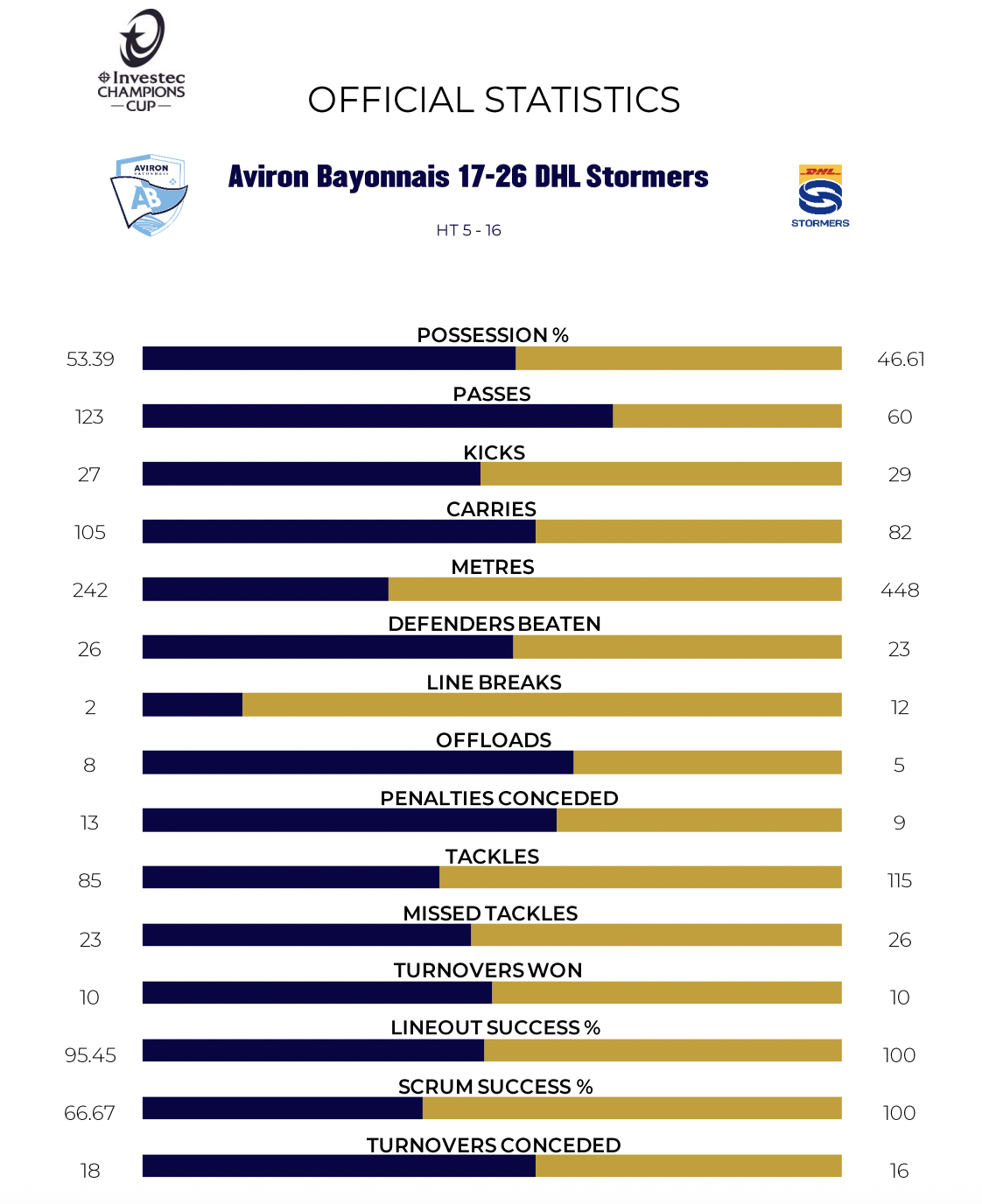
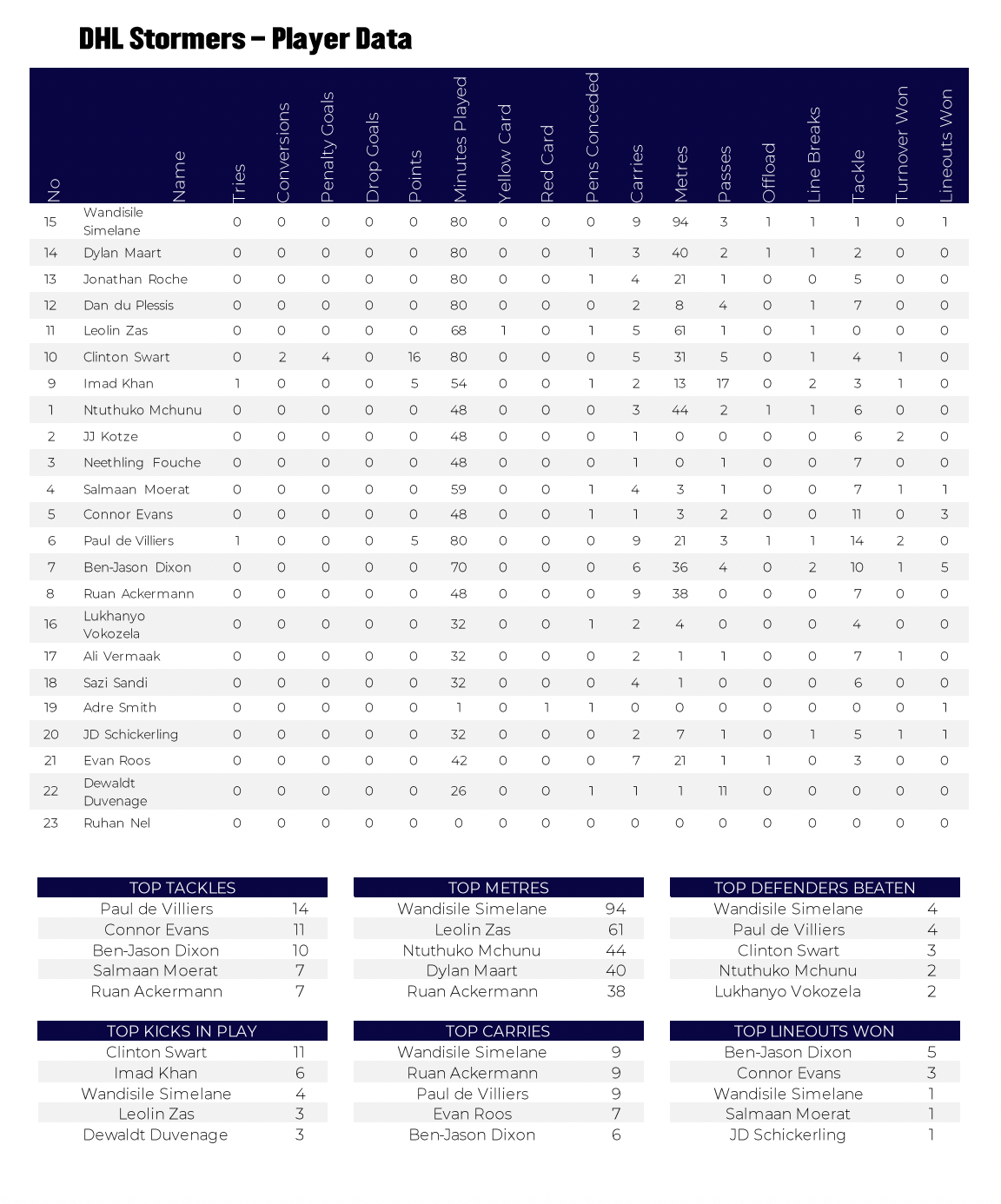
International Rugby
Investec Champions Cup: Bulls back their Boks to bully Bordeaux
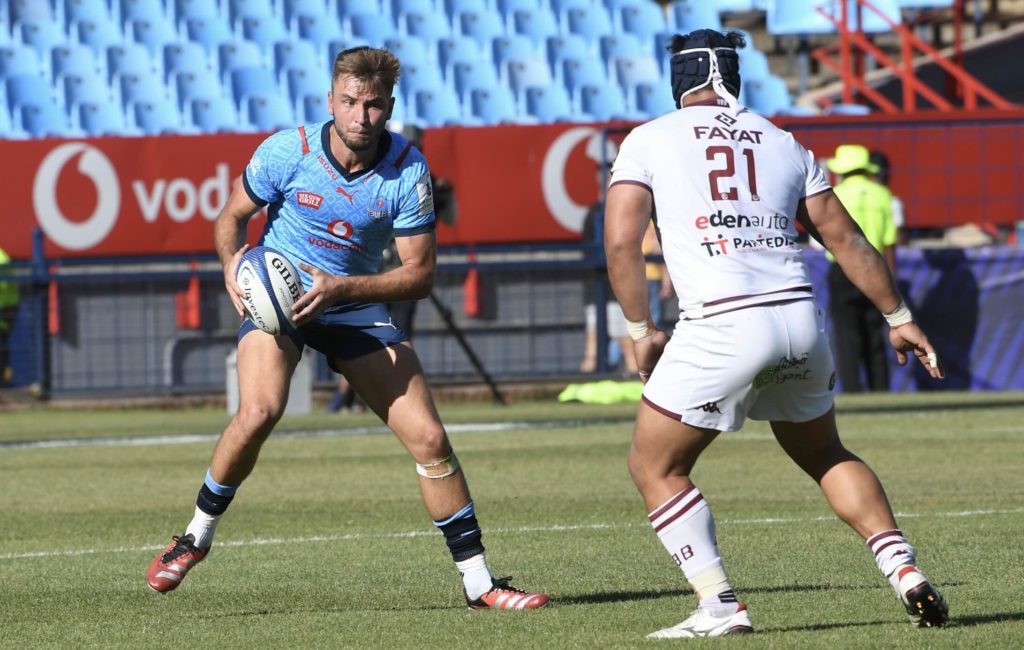
The Bulls are backing their Boks to bully champions Bordeaux of France in this weekend’s opening round of the Investec Champions Cup, writes Mark Keohane.
Every Bulls player on tour with the Springboks in November will be involved as the Bulls look to maker a statement performance against last season’s champions.
Bordeaux and the Bulls played each other at Loftus in the 2024 Pool Stages, with the Bulls winning a 12-try thriller 46-40. Both teams scored six tries two seasons ago and the difference ultimately proved two penalty kicks.
Handre Pollard, the king of kickers, returns to Loftus for his first start in the Champions Cup in the colours of the Bulls. Pollard’s previous Champions Cup history had been with French club Montpellier and English club Leicester.
Pollard will be significant to any Bulls challenge in the greatest club competition in the world, but it is the potency of a power bench that will be the determining factor in this match.
The starting front row from the Springboks 73-0 against Wales in Cardiff a week ago, are on the bench in Gerhard Steenekamp, Johann Grobbelaar and Wilco Louw. Ruan Nortje, the Boks form lock, is among the replacements, as are Elrigh Louw and Embrose Papier, who have played for the Springboks.
AFRICA PICKS: HOW TO CASH IN ON BULLS, SHARKS AND STORMERS
Louw will start his first match in a year after a lengthy spell out of the game because of injury.
Springboks flyer Canan Moodie links up with Springboks Test Centurion Willie le Roux in a back three complimented by the talents of winger Sebastian de Klerk and current Bok Marco van Staaden joins former Bok Marcelle Coetzee in the back row.
There are 13 Springboks in the match 23, with eight of them part of the Springboks 2025 squads. That includes Elrigh Louw, who was picked in the initial squads but did not play because of injury rehabilitation.
WATCH: KEO & ZELS ON THE BULLS, STORMERS AND SHARKS
The Stormers have also mixed and matched for their opening round at Bayonne, where the hosts only home defeat last season was to the Bulls in the Champions Cup.
Boks back superstars Sacha Feinberg-Mngomezulu, Damian Willemse and Cobus Reinach were not considered for the match, given their heavy workloads for the Stormers and Boks over the past two months, but Boks flanker BJ Dixon will play.
The Sharks, who play six-times champions Toulouse, are without several of their current Boks, but will still field a match 23 with international experience.
It is unlikely to be enough to prevent a one-side beating, given the Sharks struggles all season in the URC.
BORDEAUX BÈGLES – 15 Romain Buros, 14 Damian Penaud, 13 Nicolas Depoortere, 12 Yoram Moefana, 11 Louis Bielle-Biarrey, 10 Matthieu Jalibert, 9 Maxime Lucu (c), 8 Temo Matiu, 7 Cameron Woki, 6 Bastien Vergnes-Taillefer, 5 Adam Coleman, 4 Boris Palu, 3 Carlü Sadie, 2 Maxime Lamothe, 1 Jefferson Poirot.
Bench: 16 Gaetan Barlot, 17 Matis Perchaud, 18 Ben Tameifuna, 19 Jonny Gray, 20 Tiaan Jacobs, 21 Arthur Retiere, 22 Rohan Janse van Rensburg, 23 Salesi Rayasi.
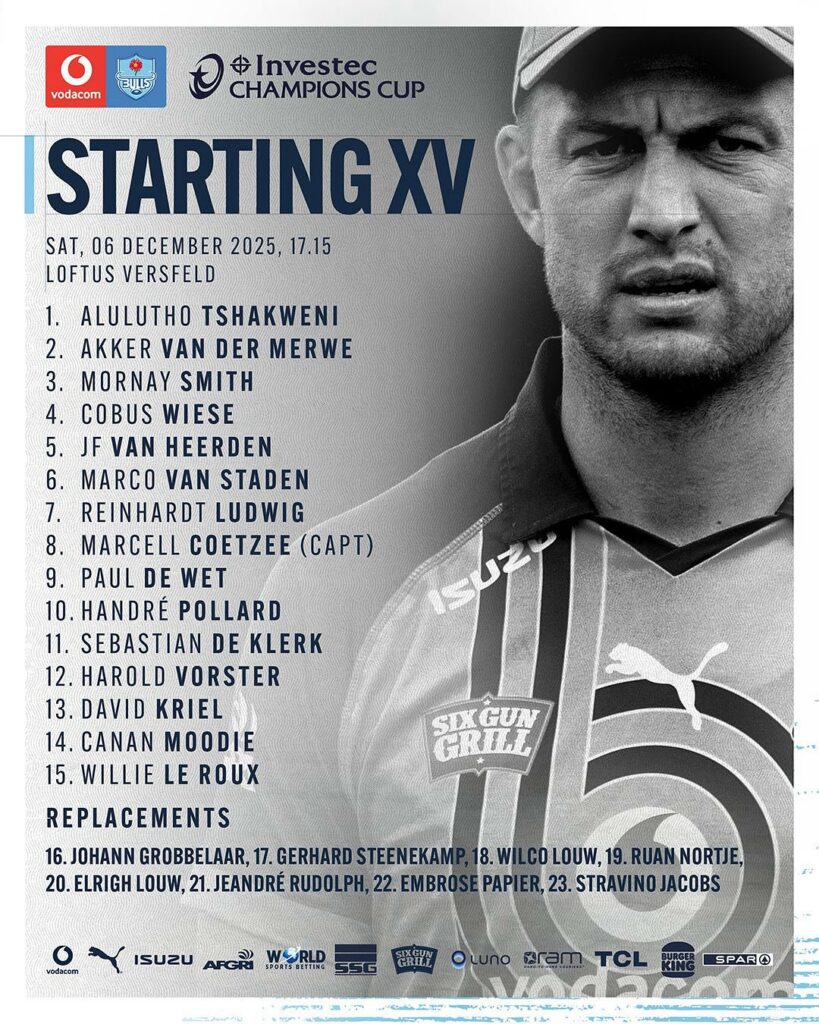
SOUTH AFRICA’S INVESTEC CHAMPIONS CUP TRIO CHASE THEIR FIRST STAR
International Rugby
Van Graan’s true impact at Munster revisited
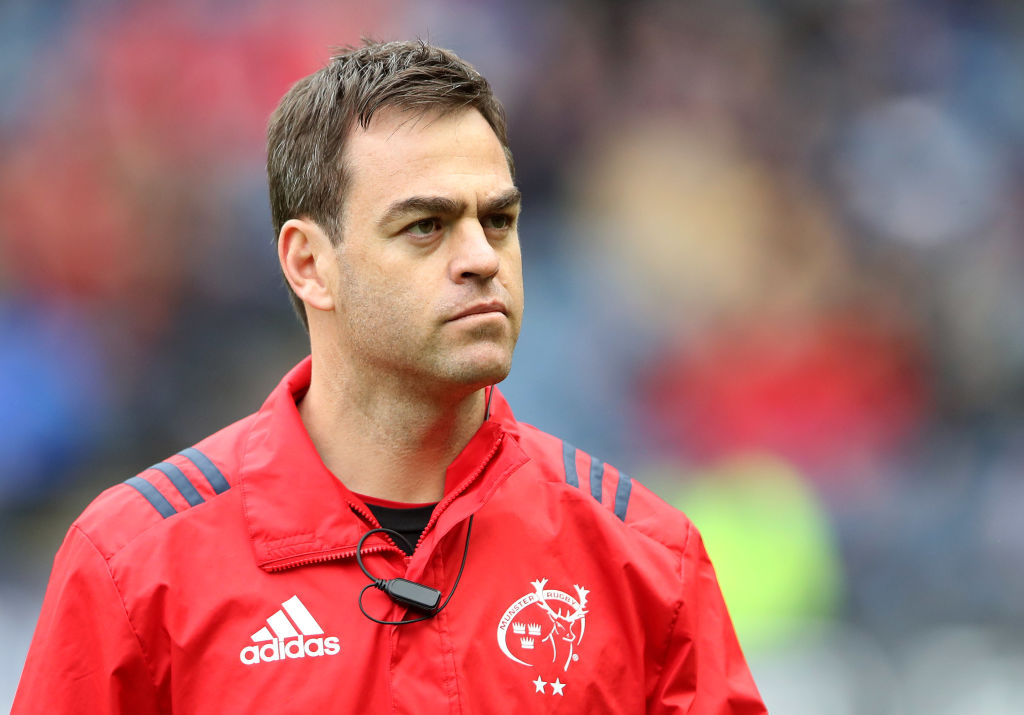
If ever there was a weekend to revisit Johann van Graan’s time at Munster then this is surely the one. And it could be that history is starting to pass more favourable judgement on his time there, and certainly of him as a coach. It should do.
As Bath host Munster in the Investec Champions Cup, in part this view is coloured by what van Graan has achieved at the Rec. On foot of leaving Munster in 2022, van Graan took over a side marooned at the foot of the English Premiership. Their rise since has been remarkable.
They ended that first season with a four-game winning run to finish eighth and qualify for the Champions Cup, where they reached the knockout stages for the first time in ages.
In his second season, Bath reached the Champions Cup knockout stages again and also finished second in the Premiership, only to lose the final to Northampton 25-21. Perhaps the biggest measure of the esteem in which he is held at Bath is that during that campaign van Graan signed a six-year extension up to 2029-30.
The club’s CEO Tarquin McDonald told TNT Sports: “We brought in an exceptional head coach and, really importantly, backed him. He’s a selfless leader. Genuinely it’s about team first and club first, and that’s so important.
“We extended Johann’s contract out to 2030 and the last time we went into a second cycle with a head coach was Jack Rowell, who was with us from ’78 to ’94; our first golden era as we like to call it, and, crazily, since then we’ve never been through a second cycle with a head coach.
“Where we are now, there’s continuity, which is absolutely vital for sporting success.”
The wisdom in that long-term extension was demonstrated last season, when Bath not only topped the table but hoovered up a treble of Premiership Cup (so ending a 17-year trophy drought), Challenge Cup and Premiership, which was their first league title in 29 years.
This is particularly ironic as the main source of criticism directed at can Graan is that his five seasons at Munster were trophyless. Yet, while Munster won the URC title under Graham Rowntree in 2022-23, is that too crude a yardstick?
Van Graan was derided for pointing to Munster’s 80 per cent winning record in his fifth season there. Yet it is true, and it has never been matched in Munster’s three completed seasons since. Indeed, Munster’s 67 per cent winning ratio overall in van Graan’s five seasons at Munster has dropped to 55.5 per cent in the three campaigns that followed.
Munster were also much more consistent, knocking on the door every season in both competitions. They reached three semi-finals and a final of what is now the URC before invariably running into the machine that was Leinster. In the Champions Cup, Munster also reached two semi-finals, a quarter-final and a round of 16. In the last three seasons they’ve had two last-16 exits and one quarter-final after that epic win in La Rochelle. That was their only knockout win in the Champions Cup since van Graan moved on.
His Wikipedia page says: “Van Graan’s Munster legacy is debated”. It adds: “While he took them to five semi-finals and a final, he never won a trophy. Some critics perceived his style as overly conservative.
“However, figures such as Simon Zebo have defended his record, describing Van Graan as a ‘master tactician’.”
Zebo told The Irish Times this week: “He goes into unbelievable detail. I would rate him very highly as a coach. He’s very good at finding little gaps or weaknesses in the opposition and he’s unbelievable at filling you with confidence and detail. He creates a very good environment. I enjoyed working with him and he’s a gentleman.”
Current players and coaches at Munster have said the same these past few weeks. In discussing his time at Munster, Tadhg Beirne told me, without being prompted: “I thought Johann was incredible when he was in there. I thought at times he got a hard rap for what he did, but in terms of the circumstances and what he was producing, it was very impressive.”
Beirne is not surprised by what van Graan has achieved at Bath.
“No, but if you look at his track record at Munster, he was getting us to semi-finals and finals all the time. I thought he was an unbelievable coach.
“I got on unbelievably well with him, and I thought he managed the group quite well. I thought he got the best out of a lot of players. I know, obviously, there’s going to be a lot of players who dislike him, because that’s like any coach, if you’re not playing, I suppose, as well, it’s easier not to like someone.
“I don’t know what the situation was in Munster at the time, but he probably wasn’t able to bring in the people he would have liked to have brought in. But what he achieved with us was still pretty impressive. It’s just you would have liked to have seen him have silverware on top of it, because I think he was deserving of it.”
John Hodnett was given his first Munster cap by van Graan, and admits his view is coloured by that.
“You always remember the coach that gave you your first cap, and he gave me my first cap. So yeah, I’d have good time for him. He’s a nice way about him. He’s a very nice man. He has a good plan in place. He gets good people in.”
Asked about van Graan’s legacy at Munster this week, Denis Leamy said: “Johann is a brilliant coach. He’s very highly rated. One thing that I’ve noticed here, you’ll never hear anyone say anything bad about Johann. He’s always spoken about in a really positive light.
“My own experiences with him have been nothing but insightful and he’s very generous with his knowledge. I worked with him here for maybe three months when I was working with the academy and I just thought he was a fountain of knowledge.
“It’s great to see him push on and achieve such great things with Bath over the last couple of years. They won three trophies last year, so fair play to him. It’s a great sign of his progression.”
International Rugby
South Africa’s top club trio chase their first Investec Champions Cup star
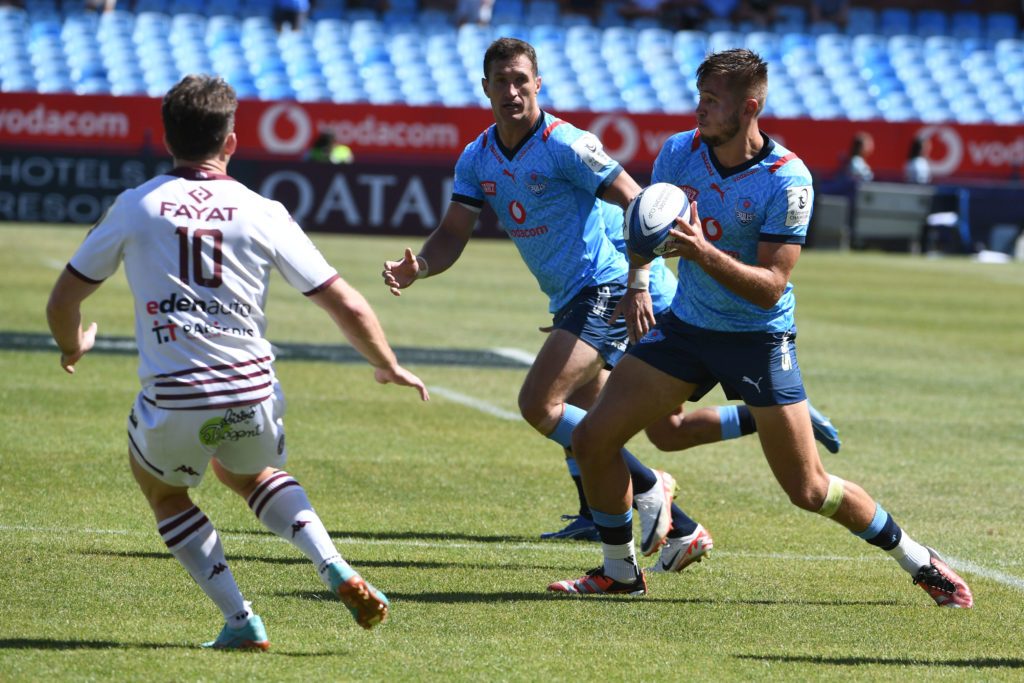
South Africa, at Test level, rules the rugby world, but in the Investec Champions Cup, the toughest club competition in the sport, the winning of the golden star has remained elusive for South Africa’s top club trio, writes Mark Keohane.
Toulouse, with six stars (titles), are the most successful club in the history of the Investec Champions Cup. Ireland’s Leinster have four stars and Toulon and Saracens have three each. For the rest, it has been a fight to get on the board and just 13 of the 40 clubs from Europe and South Africa have won the title.
It shows just how tough it is to succeed in the most battle hardened and complex knockout tournament in world rugby.
Saracens and England veteran Jamie George described the tournament as a World Cup knockout played over six months, with each match, from the opening league match, to the final, a knockout.
Home wins, in the league stages are non-negotiable, and wins on the road are as golden as the star the players are chasing.
Northampton’s Saints last season travelled to Pretoria and stunned the Bulls in the league stage, which proved crucial to their play-offs, where the English club won at the Aviva Stadium in Dublin against Leinster, before being edged 28-20 by France’s Bordeaux.
The defending champions are in South Africa to start the defence of their historic first ever Investec Champions Cup title. They play the Bulls at Loftus in Pretoria on Saturday, revisiting the scene of their dramatic 46-40 league defeat to the Bulls on the 20th January, 2024. It is the only time the two teams have met in the competition.
Both teams scored six tries in a 12-try thriller, with Bordeaux finishing the stronger.
Bordeaux, winners of the title in Dublin last season, beat their French rivals Toulouse in the semi-finals, but lost in the final of the Top 14.
The Bulls also lost in the final of last season’s United Rugby Championship, beaten by Leinster in Dublin, and both teams have had an indifferent start to their local competitions. The Bulls are three from six in the URC, having lost their last two matches, including a stunning home upset against the South African Lions last Saturday, while Bordeaux are also three from six in the Top 14, including successive defeats in the past fortnight, at home to Pau (33-34) and away to Montpellier (24-28).
The defending champions have a star-studded international squad with French flyhalf Matthieu Jalibert and flying wingers Louis Bielle-Biarrey and Damian Penaud among the best in the world.
South African prop Carlu Sadie is a regular in the Bordeaux set-up, as is the popular former All Blacks and current Tongan captain and 150 kilogram prime rugby beef Ben Tameifuna.
French scrum half Maxime Lucu is the general of a squad that includes a handful of imports from Australia and the Pacific Islands.
The Bulls, with 20 Springboks, past and present in their Champions Cup squad, will have their imposing Bok quartet of Gerhard Steenekamp (loosened prop), Johan Grobelaar (hooker), Wilco Louw (tighthead prop) and Ruan Nortje (lock), back for the tournament.
All four featured prominently in the Springboks five successive Tests wins in the Northern Hemisphere during November.
Springboks double World Cup winner Handre Pollard is another who will significantly improve the Bulls prospects of being the first South Africa team to wear an Investec Champions Cup star.
The struggling Sharks have the toughest of starts, away to Toulouse this weekend, while the in-form Stormers are in France to play Bayonne, who last season lost just once at home. That defeat was to the Bulls.
For all the latest EPCR Investec Champions Cup News
Follow the news on the Bulls, Sharks and Stormers
Investec Champions Cup fixtures (Round 1, SA times)
Friday, 5 December
Bayonne vs Stormers, 10pm
Sale Sharks vs Glasgow Warriors, 10pm
Saturday, 6 December
Saracens vs Clermont, 3pm
Bulls vs Bordeaux Begles, 5:15pm
La Rochelle vs Leicester Tigers, 7:30pm
Leinster vs Harlequins, 7:30pm
Scarlets vs Bristol Bears, 10pm
Bath vs Munster, 10pm
Sunday, 7 December
Pau vs Northampton Saints, 3pm
Toulouse vs Sharks, 5:15pm
Gloucester vs Castres, 5:15pm
Edinburgh vs Toulon, 7:30pm
International Rugby
World reaction: Boks turn Cardiff into a crime scene
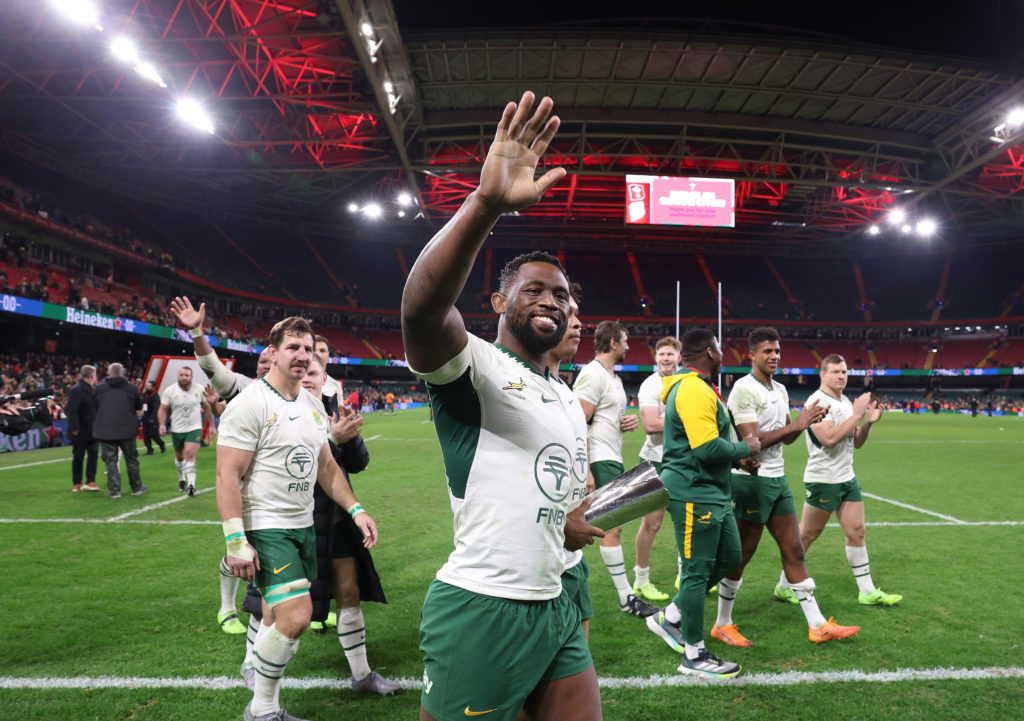
The global rugby press reaction to the Springboks 73-0 slaughter of Wales in Cardiff was split three ways: awe at the Boks, horror at Wales, and anger at the red-carded Eben Etzebeth.
The global rugby media didn’t so much report on South Africa’s 73–0 demolition of Wales as conduct a post-mortem.
Eleven tries, a clean sheet and a performance dripping with menace left the Welsh press stunned, the English papers grim, and the New Zealanders nodding with familiar respect. For the Springboks, it was another ruthless reminder of the standard they set.
For Wales, it was a national reckoning.
WalesOnline labelled it the “darkest day in Welsh rugby”, a humiliation years in the making. Their writers spoke of sadness and inevitability as a proud Test nation was “pulverised” in its own cathedral.
The Times questioned whether “men against boys” even captured the mismatch, praising South Africa’s precision while condemning Eben Etzebeth’s moment of madness as the only stain on an otherwise brutal masterclass.
The Sunday Telegraph called Wales “pointless” in every sense: a non-contest, a miscalculated fixture, and a record defeat that exposed the gulf in class.
The Rugby Paper described an “avoidable mismatch” that taught Wales nothing about their future and reinforced everything about South Africa’s relentlessness.
From a South African lens, the tone was clinical rather than triumphant.
SA Rugby Magazine, TimesLIVE and Keo.co.za all stressed that this was the full stop on an unbeaten tour and another data point in Rassie Erasmus’s expanding blueprint. Fringe players flourished, structure and brutality blended seamlessly, and the trademark refusal to concede even a consolation point in the 80th minute said more about this team’s identity than the scoreline.
Even in New Zealand, the reaction was clear: NZ Herald credited a “superpower doing superpower things” and noted that South Africa end the year not only as world champions, but as the sport’s pace-setters.
The world didn’t just witness a hiding. It witnessed a statement.
South Africa’s standards are non-negotiable. Their depth is frightening.
And Wales – under-strength, underpowered and overwhelmed.
KEO & ZELS – SIYA’S BOKS PURR WITH PERFECTION
WalesOnline – “Welsh team crumble in record home defeat”
WalesOnline’s match coverage framed this as the darkest day in Welsh rugby at the Principality: 11 unanswered tries, first time “nilled” at home in decades, and a scoreboard that felt like an execution rather than a contest. Their pieces stressed how under-strength Wales were, but made it clear that selection politics and WRU mismanagement created the circumstances for this humiliation. The tone mixed shock and resignation – the sense that this 73-0 was years in the making. Follow-up reaction columns spoke of “very real sadness” and a tragic unravelling of a proud Test nation in front of its own people. Flashscore+1
Welsh Sunday voice – Nation.Cymru / Welsh reaction
As a distinctly Welsh lens outside the big UK dailies, Nation.Cymru’s weekend take treated 73-0 as a national reckoning. The piece stressed that the result wasn’t just about missing Premiership-based players; it was about a structural decay in Welsh rugby – from pathway to finances – exposed brutally by the world champions. The article highlighted a fanbase oscillating between anger and apathy, a stadium with worrying gaps in the stands and a governing body “out of answers”. It argued that the scoreline must force WRU members to confront whether the current model can produce anything other than more days like this. The Independent+1
The Times / Sunday Times (London) – Steve James
In The Times (from the same London stable as the Sunday Times), Steve James called it “every bit as grim as feared”: a physical mismatch that made “men against boys” feel like understatement. He emphasised the Boks’ scrummage and aerial dominance, Sacha Feinberg-Mngomezulu’s 28-point masterclass and Wales’ inability to execute even basic set-piece chances. But his central theme was Etzebeth: the eye-gouge described as a “blatant act of thuggery” that soiled a magnificent team performance and will likely bring a long ban. For Wales, he portrayed a low ebb – empty seats, fragile confidence and shallow depth laid bare. The Times
Sunday Telegraph – James Corrigan
For The Sunday Telegraph, James Corrigan’s live report and follow-up hammered home one idea: “pointless Wales”. His copy stressed how uncompetitive the hosts were from the opening scrum, how quickly South Africa’s power game turned into a procession, and how little value the fixture offered anyone by the final quarter. Corrigan underlined that this was Wales’ worst home defeat and first Cardiff whitewash since the 1960s, and questioned the wisdom of scheduling such a mismatch outside the Test window. He also leaned into the Etzebeth incident, arguing that an 11-try rout did not need to be accompanied by such unnecessary nastiness. Telegraph+1
The Rugby Paper (UK) – weekend broadsheet
The Rugby Paper’s headline – “Steve Tandy’s pointless side put to shame in 11-try thrashing” – captured its harsh verdict. Their report stressed how this was a weakened Wales, stripped of Premiership-based players, but insisted that didn’t excuse the scale of collapse. The analysis described South Africa as operating in a different weight division, with their bench alone out-capping the entire Welsh match-day 23. The paper portrayed the game as a damaging non-contest that taught Wales nothing, eroded public faith and raised serious questions about WRU strategy. The Etzebeth red card was the grim coda to what they saw as a “needless mismatch”. Ground News+1
Planet Rugby – Winners & Losers
Planet Rugby’s “Wales v Springboks Winners & Losers” piece leaned into the contrast: Sacha Feinberg-Mngomezulu, Andre Esterhuizen and the Bok pack among the big winners; Eben Etzebeth and the sport’s image squarely in the losers column. They praised South Africa’s “floor-filling tunes” in attack – the variety of their strike plays and the fluency of a heavily rotated side – and highlighted Esterhuizen as the poster boy of Rassie’s hybrid revolution, this time unleashed as a classic ball-carrying 12. On Wales, the verdict was that an under-powered side were “out of their depth” and that 73-0 will haunt the WRU for years. Planet Rugby+1
Rugby365 – Warren Fortune & Leezil Hendricks
On Rugby365, Warren Fortune’s match report and Leezil Hendricks’ player ratings built a coherent picture: South Africa ended their Nations Series with a “73-0 command performance”, scoring 222 points across the tour and conceding just 51. The site stressed how thoroughly the Boks dominated the collisions and set piece, and how many so-called fringe players enhanced their 2027 World Cup credentials. Follow-up video pieces focused on Rassie Erasmus’ reaction to Etzebeth’s red – Erasmus admitting the card was justified and that “the optics weren’t great”. At the same time, Rugby365 emphasised how ruthlessly the Boks defended their line in the closing minutes to protect the nil. Rugby365+3Rugby365+3Rugby365+3
Keo.co.za – Mark Keohane
On Keo.co.za, your “Andre the Giant & his fellow Boks slay the Dragons” column framed 73-0 as the ultimate expression of Rassie’s “no let-up” mentality. You leaned into the symbolism of the Boks still fighting for a turnover in the 79th minute with the score already at 73-0, arguing that this spoke to the aura and internal standards of this group. The piece highlighted the dominance of the forwards, the impact of Esterhuizen in his new hybrid role, and the statement made by finishing an unbeaten tour with a record win. Etzebeth’s red was acknowledged, but the core theme was character and ruthlessness rather than controversy. KEO.co.za+2KEO.co.za+2
Sunday Times South Africa / TimesLIVE
Within the Sunday Times SA / TimesLIVE stable, coverage underlined the professional coldness of the Bok performance rather than the chaos of the scoreline. The Business Day/Sunday Times reports talked of a “clinical” and “commanding” demolition that completed a clean sweep on tour and cemented South Africa’s No 1 ranking. They emphasised how many combinations Rassie experimented with across Japan, France, Italy, Ireland and Wales, yet still produced an 80-minute performance in Cardiff. The Etzebeth incident was treated as an ugly, isolated flashpoint in an otherwise near-perfect collective exhibition from a side that “simply don’t do dead rubbers”. Business Day+2Sunday Times+2
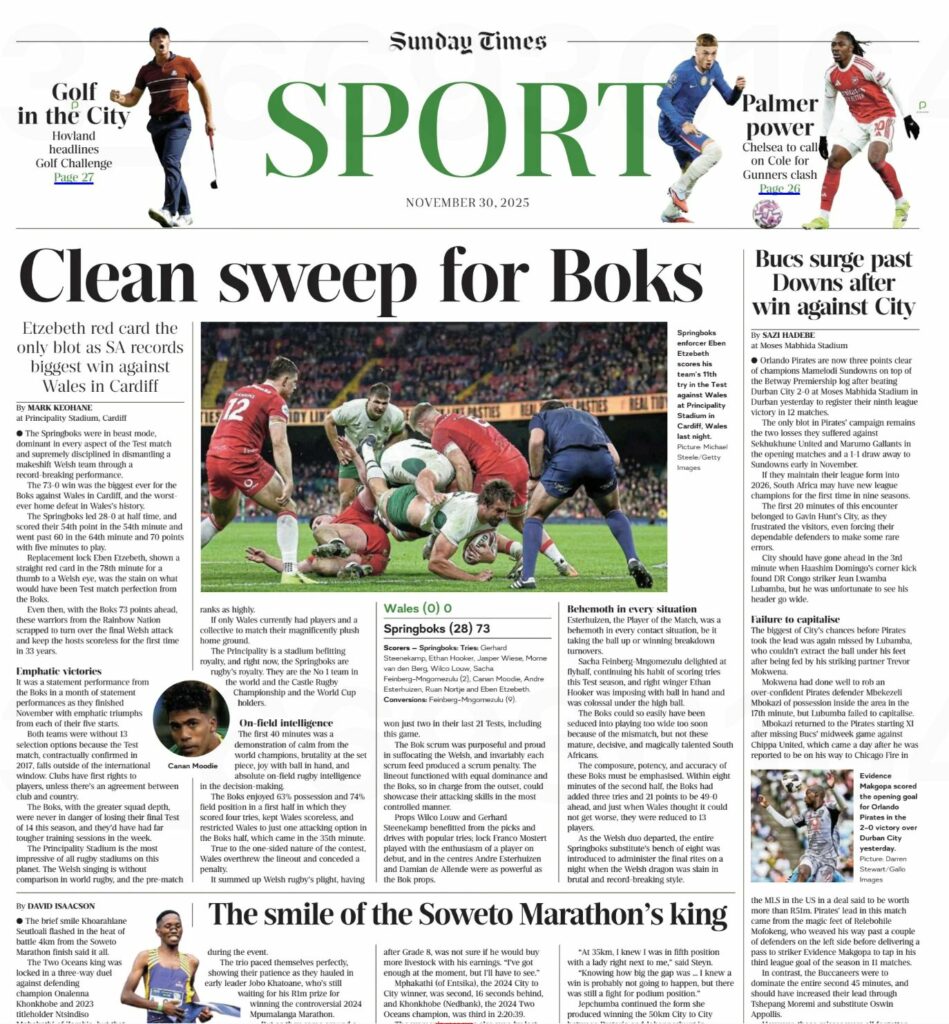
SA Rugby Magazine – Borchardt & co.
SA Rugbymag.co.za ran a suite of pieces: Simon Borchardt’s “Brilliant Boks demolish Dragons” match report, features on Rassie being “proud of hungry Boks”, Siya Kolisi hoping the red card wouldn’t overshadow things, and a big-picture “Springboks gaze down on rugby world”. The mag stressed that 73-0 was one more data point in a two-year stretch of dominance, not a freak outlier. They homed in on the hunger of fringe players, the work-rate in chasing the shut-out and the seamless integration of youngsters like Feinberg-Mngomezulu. The red card was acknowledged but framed as a disciplinary headache rather than a stain on the team. SA Rugby magazine+3SA Rugby magazine+3SA Rugby magazine+3
AFRICA PICKS: CASHING IN ON THE BOKS
NZ Herald – Kiwi view on a Bok juggernaut
The NZ Herald piece (“Springboks crush Wales 73-0 in historic test demolition”) was a wire-style report but with a clear Kiwi subtext: respect for a rival superpower doing superpower things. It highlighted Feinberg-Mngomezulu’s Llandovery College link and 28-point haul, noted that this surpassed England’s 68-14 as Wales’ worst home defeat, and pointed out it was the first time Wales had been held scoreless at home in the professional era. For New Zealand readers, the article placed the rout in the context of South Africa closing 2025 with 12 wins from 14 Tests, reinforcing the sense that the Boks remain the team to beat in world rugby. NZ Herald+1
Planet Rugby, RugbyPass & others
RugbyPass, Guardian live, ESPN, RTE and TNT Sports all reinforced the same themes: “men against boys”, a structural Welsh crisis, a Bok machine that finishes the year indisputably No 1, and a sour taste from Etzebeth’s red. Many pundits, notably Dan Biggar on TNT, questioned whether such mismatches should continue to be scheduled; others argued it showed exactly why South Africa are on a different tier to every northern-hemisphere side right now. TNT Sports+4The Guardian+4ESPN.com+4
*Compiled by Keo.co.za & ChatGPT (All references verified)
International Rugby
Saluting the remarkable Boks career of Cobus Reinach
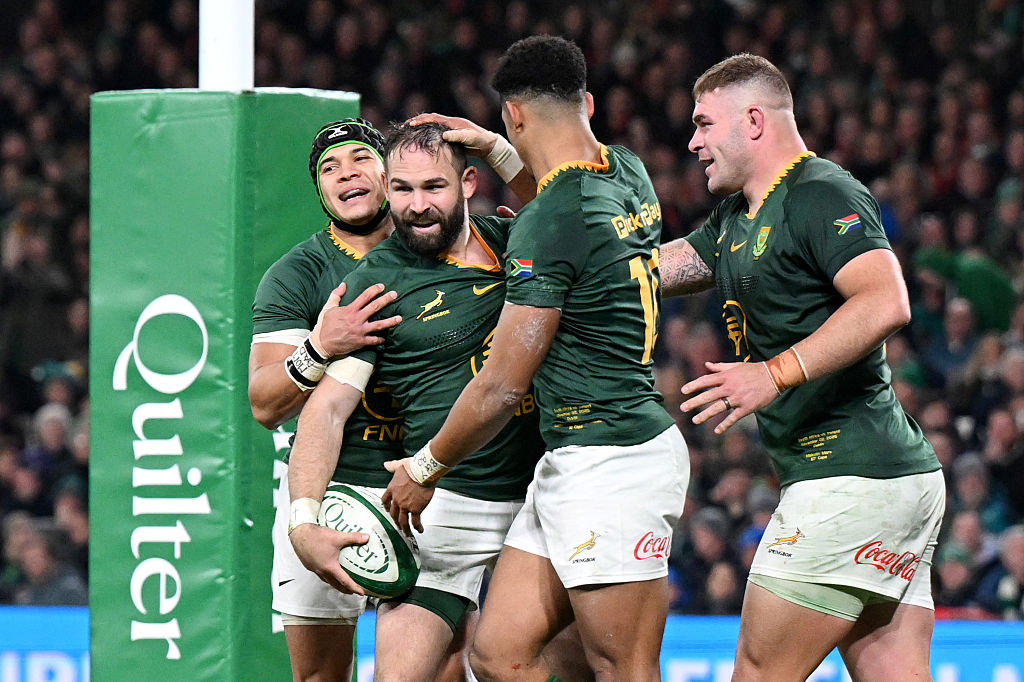
Springboks No 9 Cobus Reinach plays his 50 Test in Saturday’s season finale against Wales in Cardiff. It is a salute to a remarkable Test career, in which Reinach has shown that patience is a virtue and from patience comes the ultimate rewards, writes Mark Keohane.
I’ve covered enough Test rugby since 1992 to know that some players arrive like fireworks, bright and loud, and then disappear before the smoke has even cleared. And then there are players like Cobus Reinach, who is built on staying power, steel, speed, and a stubborn refusal to ever be counted out.
Reinach’s 50th Test comes 11 years after he debuted for the Boks at Newlands against Australia in 2014. He was 24 then. He is 35 now, and he looks quicker today than he did the afternoon he played his first Test.
That alone tells you everything about the athlete and the attitude.
But to salute Reinach purely as a survivor undersells him because he has thrived wherever he has played, be it in South Africa, England or France, at club level or for the Springboks.
He has done more than most scrumhalves who have ever worn the No 9 jersey for South Africa. Two World Cup titles and a hattrick in four minutes – the fastest in Rugby World Cup history – against Canada in 2019. He has scored 19 tries in 49 Tests.
And then there’s what he has done in the past month: two individual tries, each worthy of its own movie trailer. There was the crucial scorcher against France at the Stade de France in Paris that showcased his straight-line speed, and one as important against Ireland in Dublin, where again instinct and acceleration combined for five points.
Reinach has been electric throughout the Castle Rugby Championship and the November internationals, whether starting or closing out the Test.
Reinach, who made his Stormers debut a fortnight after being part of the Boks’ Rugby Championship title defence, played nine consecutive years overseas, at Northampton’s Saints for four years and then for the past five at Montpellier in France, where he finished on 103 matches. He played 76 for the Saints.
BOKS GO FOR THE KILL AGAINST WALES
He was never a case of ‘out of sight and out of mind’. He was always a part of the national equation under Erasmus and Jacques Nienaber.
Rassie Erasmus, speaking after the 2019 World Cup pool win over Canada, said: “Cobus is one of the best finishers in world rugby. His speed is one thing, but his attitude is what sets him apart. He never stops working.”
Jacques Nienaber has always maintained: “Cobus brings intensity. Whether he plays ten minutes or 80 minutes, he changes the game. That’s his gift.”
Montpellier’s Philippe Saint-André, upon his arrival at the French club, called Reinach “the fastest scrumhalf in the world – and the most professional player in the squad.”
Teammate Jesse Kriel, ahead of the 2023 World Cup playoffs, said: “Cobus doesn’t age. He trains like a 20-year-old and competes like a Springbok who knows the standard. We trust him with our lives.”
Even the great Aaron Smith, after the Boks beat the All Blacks in Auckland in 2014, commented privately (later repeated in interviews): “That No 9 is rapid. South Africa have something special there.”
WIN WITH THE BOKS & AFRICA PICKS
Everyone who has ever played with him or against him has said the same thing in different ways: Reinach is a game-breaker. You blink and he is gone. You hesitate and he burns you. You switch off and he is already under the posts.
For me, the beauty of Reinach’s Test career is that it hasn’t followed the script. It hasn’t been linear or predictable. He never became the “permanent” Bok No 9, but he became something far more valuable in being the player who can tilt a Test match at any moment, from anywhere on the field. He has been and is a player whose selection is never a gamble, because the return is almost always guaranteed.
KEO & ZELS TALK BOKS AND COBUS REINACH
He is the definition of a 23-man squad player in the modern era: dependable, devastating, disciplined.
Reinach’s route wasn’t easy and many within South Africa felt that he left the country when at the peak of his powers, but he continued to improve at the Saints and Montpellier.
His club mates speak of his lack of ego, his obsession with conditioning, his attention to video detail and his leadership and mentoring of newbies or less experienced players.
Saint-André once joked: “Cobus doesn’t drink wine. He doesn’t eat dessert. He eats speed.”
At 35, playing his 50th Test, he is still eating speed and burning international defences.
When I think of Reinach, I think of the Springboks’ identity under Erasmus and Nienaber, which is one rooted in readiness and not reputation.
There have been exceptional scrum halves playing for South Africa in the past 11 years, which is a statement on its own that Reinach gets to 50 appearances in Cardiff.
Cobus Reinach’s career is a lesson in perseverance, professionalism, and possibility, and a reminder to every wannabe Springboks scrum half in South Africa about consistency and relentless work ethic.
READ SA RUGBY MAG FOR ALL THE BOKS V WALES TEST PREVIEWS
International Rugby
Boks are back in Cardiff and going for the kill against Wales
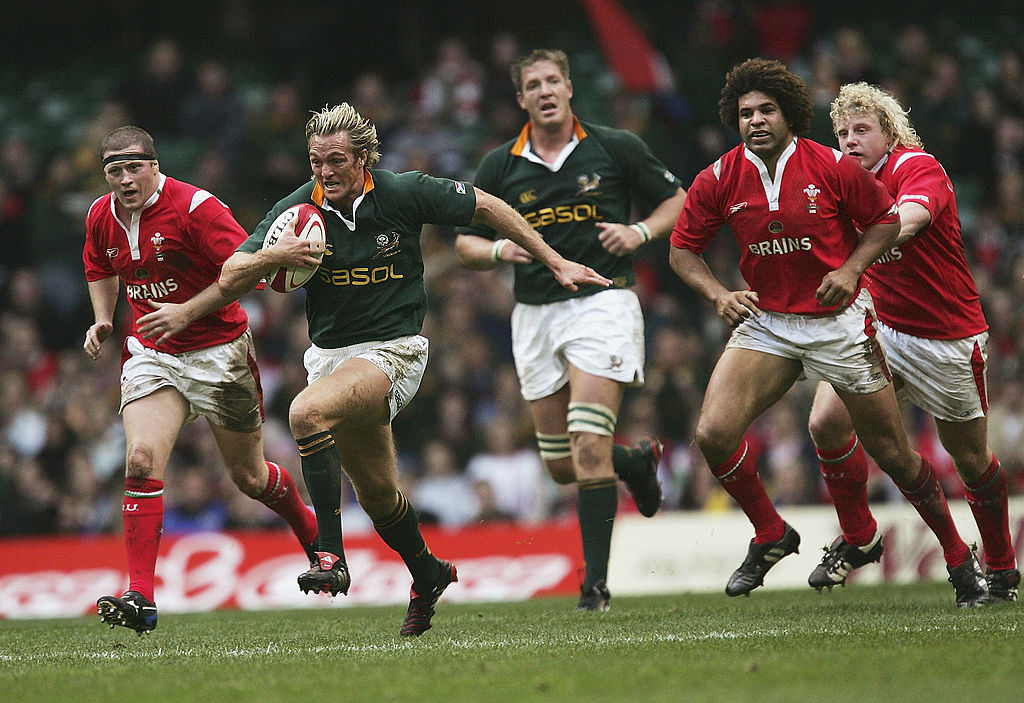
There will be no let off from Rassie Erasmus’s Springboks in their final Test of 2025 in Cardiff against Wales, and that is the attitude there should be from the sport’s best team, the official No 1 team for 2025 and the current World Cup holders, writes Mark Keohane.
Springboks coach Rassie Erasmus has shown Welsh rugby the utmost respect by picking his strongest available match 23 for a Test the Boks are expected to win with a record score.
Wales are without 13 of the players who fronted the All Blacks a week ago, and while the Boks are missing as many, there is no comparison in the quality of depth in both national camps.
Wales have won just two of their last 20 internationals, but there is a high regard within the Boks set-up, especially from Erasmus for what Welsh rugby represents.
There was a time, not long ago, that Wales was smashing the Boks, has been a consistent echoed by Erasmus this week.
In Erasmus’s first tenure as Bok coach, he won just seven from 14 Tests, losing to Wales in Washington DC in his first Test in charge and finishing the season beaten in Cardiff by Wales again.
There was the brutal 16-9 World Cup semi-final win in Japan in 2019, but what followed was a last minute win, via a Damian Willemse penalty at Loftus, a last minute defeat in Bloemfontein and then a tough 30-14 win in Cape Town to seal a 2-1 home series win.
In the past few seasons, it has settled more in Erasmus’s favour and Cardiff has become the happy hunting ground it was for Erasmus as a player.
Erasmus appreciates and recognises tradition and he knows just how passionate the Welsh are about their rugby.
They may be in a slump, but it was only eight years ago and Boks supporters were burning the Boks jersey and Wales were on a winning streak against the Springboks.
Erasmus has honoured the meaning of Test rugby with the strength of his selection, but also showcased how brilliantly he has integrated new squad players, post the 2023 World Cup, and managed the playing demands of veterans he is giving every chance to make it to Australia in 2027 for the challenge of an unprecedented third successive RWC title.
Carifff is a great city for Test rugby fans, none more than the Boks supporters, with so many making the trip down from London and various part of England, Scotland and Ireland.
The Principality Stadium is a rugby cathedral and magnificently impressive in terms of a spectator experience.
I was fortunate to report on the Boks win against Wales in 1996, which was the last time they played at the Cardiff Arms Park, before construction began for the building of the Millennium Stadium, which is now the Principality Stadium, right opposite the famous Angel Hotel, where again I was blessed to stay in the week the Springboks beat the All Blacks in the 1999 World Cup play-off for third place.
Breyton Paulse scored the only try of the play-off.
In my time covering the Springboks and being a part of the management, I have wonderful memories of great wins, even more impressive post-match experiences celebrating and a rich joy at the gift it is to write about and, having been part of, the Springboks.
The 1996 win was sweet and compelling. The Boks won 37-20 in what would be Andre Markgraaff’s last Test in charge.
The next time the Boks beat Wales away from home was at Wembley Stadium in 1998, as the Millennium Stadium had not been finished.
I missed the 1999 once-off visit to the Millennium Stadium when the Welsh stunned Nick Mallett’s Springboks. The Stadium was not yet complete, in terms of the stands, but the day is a historic one for Wales.
I was back with the Springboks under Harry Viljoen, working as Communications Manager, and the Boks won a difficult match 23-13 in 2000. We returned to Cardiff for the last match of the tour to beat a star studded Barbarians 41-31, and then did a Sunday all night season-ending party at the Walkabout in Mary Street. It was glorious.
There were wins for Jake White’s Boks in 2004, 38-36, in a match where Newport-based Percy Montgomery thrived and produced a Player of the Match performance. White’s Boks also won comfortably in 2005 and 2007 and Pieter de Villiers’s Boks enjoyed success in Cardiff in 2008 and 2010.
Heyneke Meyer continued the Boks success story in Cardiff in 2013, but in 2014 his Boks lost 12-6.
This started an unprecedented period of Welsh dominance over the Boks in Cardiff, with Bok coach Allister Coetzee’s team losing in 2016 and 2017.
Erasmus’s Boks lost 20-11 in 2018, but ever since then it has been all South Africa in Cardiff.
Frans Steyn, as a replacement, turned back the clock with a glorious kicking display to engineer a 23-18 escape for the Boks in 2021 and in 2023 Jacques Nienaber’s Boks, en-route to the World Cup, produced the biggest ever win for the Boks against Wales in Cardiff.
The Boks won 52-16 and completed their 2024 season with a 45-12 win.
KEO & ZELS: BOKS TO BURY WOEFUL WELSH
The bookies have given Wales a 38 point start, which means if you bet on them losing by under 38 points you are in the money and if you go with the Boks to win by more than 38 points, you are in the money.
WIN WITH AFRICA PICKS – BACK THE BOKS
If the Boks do win by 38 or more points, then it will represent another record for Erasmus and Siya Kolisi’s already record-breaking world champions.
It’s good to be back in Cardiff, after a decade of missing this match-up from the seats of the Principality’s Press Box.
The city is still humming and selfishly the Boks are the ones on a winning streak and favoured to make it five wins in succession against the Dragons.
READ SA RUGBY MAG FOR ALL BOKS V WALES TEST BUILD-UP
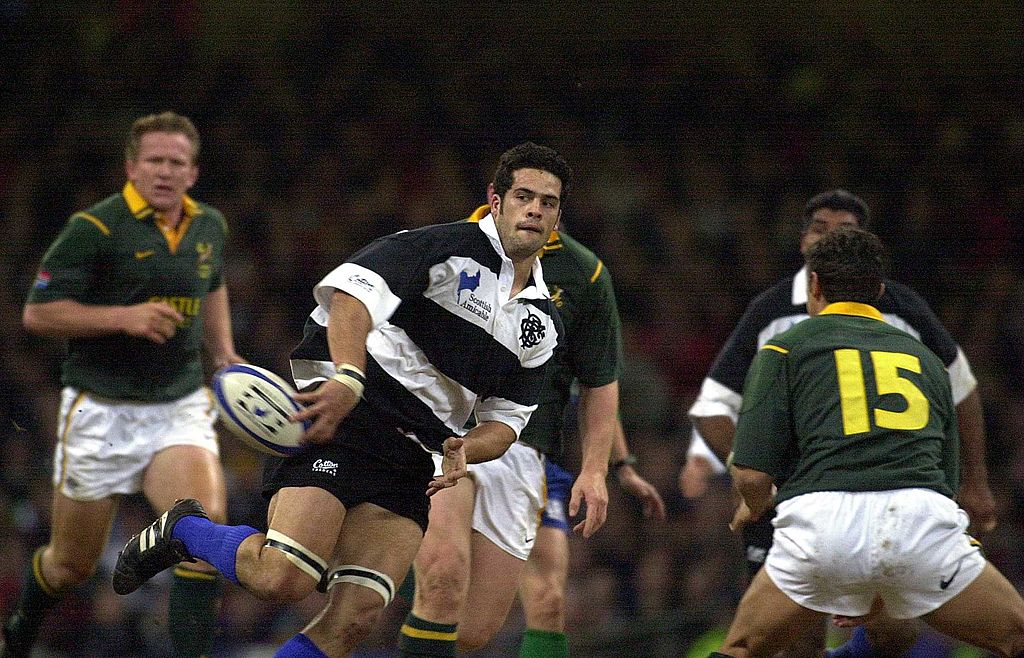
International Rugby
Boks scrum a STECO Power Play of brutal beauty
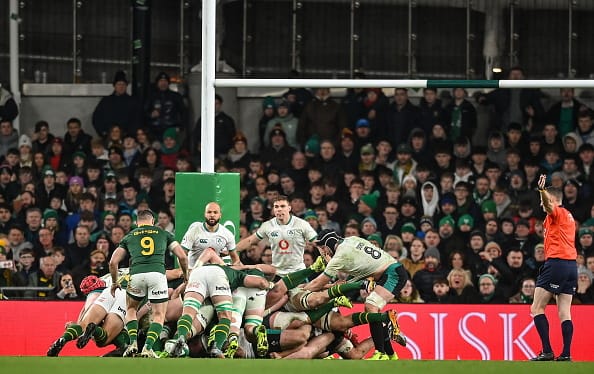
Keo & Zels were as emphatic as the Boks scrum against Ireland that the STECO Power Play was every time the Boks packed down to scrum Ireland into the Aviva turf in Dublin.
STECO is all about power, precision, sustainability and quality, and Keo & Zels, on their Rugby Podcast, said every member of the Boks pack combined to make the collective that much more powerful than any individual effort.
They acknowledge the individual try-scoring genius of Sacha Feinberg-Mngomezulu, the individual merits of Cobus Reinach, the relentlessness of Canan Moodie and the power of Damian de Allende.
But when it came to their weeks Springboks STECO Test moment, it was the Boks scrum that won the day, with the Boks feeding the scrum in 12 of the 16 scrums, and winning eight penalties on the 12 put ins. There were also more scrums on resets.
Ireland lost two players to yellow cards because of repeated scrum infringements and conceded a penalty try just before halftime to trail 19-7.
WORLD MEDIA REACTS TO POWER OF THE BOKS SCRUM
The general consensus, post the match, was that Ireland should have lost more players to the sin-bin for deliberate professional fouls at scrum time.
The Boks won 24-13; their first win at the Aviva Stadium during Rassie Erasmus’s eight years at the helm of the Springboks. It was also only the second time the Boks had played at the Aviva Stadium since Erasmus and Jacques Nienaber took charge of the Boks in 2018.
Ireland, who beat the Boks 13-8 in Pool Play at the 2023 Rugby World Cup in Paris, France, also beat the Boks 25-24 in Durban in 2024, a week after losing 27-20 to the hosts in Pretoria in the opening Test of the July internationals.
IRISH LOCK GETS SLAP ON WRIST FOR RED CARD OFFENCE
STECO IS GIVING YOU BACK YOUR POWER
The Powerful Bok scrum earns this week’s @STECO_Global #PowerPlay award! pic.twitter.com/5Cbpy9tHJt
SA Rugby magazine (@SARugbymag) November 25, 2025
International Rugby
Rugby’s world media reacts to Springboks win in Dublin

The world’s media lauded the dominance of the Springboks in Dublin against Ireland and were awed at the physicality of the world champions and No 1 team in the sport.
A summary of how the global rugby media reacted to the Springboks 24-13 win in Dublin.
The Boks scored four tries to one.
The Irish Times – Gerry Thornley
Thornley framed it as “the one that got away” for Ireland and a long-time-coming statement win for South Africa. He highlighted the Boks’ scrum dominance and physical edge, but also the surreal card chaos and inconsistency around Sacha Feinberg-Mngomezulu’s high shot versus the multiple Irish cards, leaving Ireland feeling hard done by while still acknowledging South Africa as clearly in control. The Irish Times
Irish Examiner – Simon Lewis
Lewis hit the same two big notes: Ireland’s “ill discipline” and the Springboks’ set-piece power. Ireland’s yellow-card avalanche and James Ryan’s 20-minute red created an unwinnable scenario against a pack as dominant as this Bok eight. He stressed that, even with 12 men, Ireland showed guts, but the champions were ruthless enough to end their Dublin drought. Irish Examiner
Sunday Independent (Ireland / Independent.ie cluster) – Edward Elliot & Indo Sport team
On the UK Independent (closely echoing the Indo line), Edward Elliot’s match report headlined the game as “cards, chaos and carnage” and said Ireland “paid a heavy price for ill-discipline” as South Africa ended a 13-year wait for an Aviva win. The coverage zeroed in on the five Irish cards, the decisive scrum penalty try, and Sacha’s solo effort that effectively killed the contest, while stressing that Ireland’s late fight only reduced the margin, not the gap. The Independent
On Independent.ie (Irish), the locked match piece – “Springboks’ scrum power proves unstoppable for Ireland after flurry of yellow cards” – is clearly framed around the same themes: scrum dominance, card carnage, and Boks in control. The Independent
Sunday Times (Ireland)
-
Boks physically and tactically superior at scrum time,
-
Ireland’s indiscipline fatal.
The Rugby Paper (UK) – John Fallon
Fallon’s match coverage in The Rugby Paper described a “scrum masterclass” from the Springboks and a self-inflicted implosion from Ireland. His tone was that of respect for Ireland’s resilience but little doubt about who was boss: the world champions used the set-piece to squeeze, strangle and finally break Ireland, leaving Farrell with more questions than answers two years out from 2027. The Rugby Paper
The Guardian – Brendan Fanning
Fanning’s Guardian match report ran under the headline “South Africa make heavy weather of victory over indisciplined Ireland”. He called it “a truly crazy event”, stressing how four Irish players were binned in the first half, Ryan’s card was upgraded to red, and the Boks only really converted their scrum supremacy when Ireland were down to 13. His core critique: a team this dominant at set piece should win far more comfortably – but they still reminded Ireland of the gap in power when it really mattered. The Guardian
The Telegraph (UK)
The Telegraph’s live coverage and write-up is trailed with the line that Ireland’s future questions “come to the boil” after a “plucky defeat” in which the scrum was “utterly dominant” in South Africa’s favour and Ireland were reduced to 12 men. From the available blurb, the angle is:
-
Ireland’s card-fuelled collapse at the set piece,
-
South Africa’s ruthless exploitation of that edge,
-
and the uncomfortable question of whether Ireland are slipping behind the Boks again in raw physicality and depth. The Telegraph+1
French Rugby & European Press
L’Équipe (France)
L’Équipe’s live commentary and report framed it as a “demonstration de force” by the double world champions, noting that after conquering Paris and Rome this November, the Boks had now imposed themselves in Dublin as well. They highlighted:
-
a monstrous scrum and maul,
-
Sacha Feinberg-Mngomezulu’s class with ball in hand,
-
and an Irish side that remained combative but simply couldn’t live with the Springboks’ power and pressure over 80. L’Équipe
Midi Olympique / Rugbyrama
Midol and Rugbyrama carried pieces and social posts casting the Boks as “seemingly invincible”, talking of South Africa “continuing their festival in the north” with another statement win. The tone is almost admiringly fatalistic: this Bok side, in French eyes, has turned Europe into its playground – Dublin now joining Paris and Marseille as venues where they impose their will.
New Zealand & Global
NZ Herald – AFP report
The Herald ran an AFP match report: South Africa’s first win in Dublin since 2012 after a 24–13 victory over an “ill-disciplined Ireland side that at one point was reduced to 12 men.” It underlined:
-
tries by Willemse, Reinach and Feinberg-Mngomezulu plus a penalty try,
-
Ireland’s courage in keeping the scoreline respectable,
-
and the personal milestone for Rassie Erasmus finally winning at Lansdowne Road, something he hadn’t done even as Munster coach. NZ Herald
South African Print & Online
Rapport – Louis de Villiers (Netwerk24)
De Villiers’ column “Bok-stutte wys hul spiere in Dublin-orgie van kaarte” (“Bok props flex their muscles in a Dublin orgy of cards”) sums up Rapport’s mood. He revels in the Bok front row’s destruction of Ireland’s scrum and embraces the madness of the yellow-card storm, effectively arguing:
-
chaos or not, this was a deeply satisfying, forward-dominated away win,
-
and a reminder that in the trenches, the Boks remain unmatched. Netwerk24
Sunday Times (South Africa) – Mark Keohane
In the Sunday Times, Mark Keohane’s column “Boks shake off Irish monkey” (as flagged in SA Rugby Mag’s wrap) celebrates the end of the Dublin hoodoo. His core beats:
-
Ireland were “brave”, but the Boks were “brutal”,
-
the scrum and collision dominance finally aligned with the scoreboard,
-
and Rassie’s world champions have reclaimed the psychological high ground in what’s now the sport’s premier rivalry. SA Rugby magazine
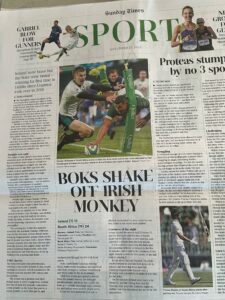
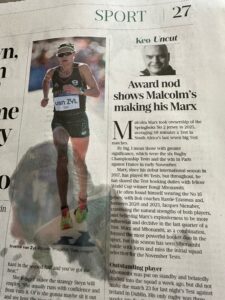
SA Rugby Magazine (sarugbymag.co.za)
SA Rugby Mag’s online coverage led with pieces like “Boks break Dublin deadlock” and “Boks crush ill-disciplined Ireland”, plus a deep-dive analysis referencing Keo’s pre-game call that the Boks would win by 11. The tone is unapologetically triumphant:
-
Dublin “belonged to the Boks” for the first time in 13 years,
-
Ireland’s aura at Lansdowne took a serious dent,
-
and the win validated Rassie’s decision to go full strength and target this fixture as the unofficial World Cup rematch that 2023 never gave them. SA Rugby magazine+1
Rugby365
Rugby365’s match report (and sidebar pieces) emphasised that the Springboks “ended their Dublin drought despite chaotic scenes” – focusing on:
-
the Boks’ dominance at scrum time and in the collisions,
-
the unprecedented five Irish cards to one South African,
-
and questions over Matthew Carley’s consistency, even while acknowledging that Ireland’s discipline invited trouble and the better team still won.
Planet Rugby
Planet Rugby’s early reaction came via their news and social channels: “Springboks too strong for ill-disciplined Ireland” and “five Irish cards in chaotic Dublin Test.” Their line is simple and punchy:
-
South Africa bullied Ireland at the set-piece,
-
ill-discipline wrecked any hope of a home win,
-
and the result re-asserts the Boks as the team to beat heading towards 2027. Planet Rugby
RugbyPass
RugbyPass ran player ratings and reaction pieces with the headline flavour of “Ireland player ratings after ruthless Springboks dismantle Andy Farrell’s men” and similar. The ratings hammered Ireland’s discipline and scrum, while giving big numbers to Malcolm Marx, Boan Venter, Eben Etzebeth and Sacha Feinberg-Mngomezulu. The key RugbyPass take:
-
this was a statement win from the Boks,
-
Ireland’s supposed set-piece improvements were “exposed” under real pressure,
-
and the contest showed there’s still a gap in depth and physicality between the sides. rugbypass.com
Keo.co.za – Mark Keohane
On Keo.co.za and its AfricaPicks crossover piece, Keohane doubled down after calling Boks by 11 in the build-up. His reaction article, effectively a victory lap, framed the win as:
-
Rassie’s Boks reasserting themselves as the sport’s true No 1,
-
Ireland’s Lansdowne aura being shattered in 80 ugly, beautiful minutes,
-
and confirmation that the rivalry is now tilted back towards South Africa, with Dublin no longer a graveyard but another green-and-gold hunting ground. SA Rugby magazine+1
Other Significant Angles
Several other outlets pushed similar themes that echo across your requested titles:
-
ESPN (Tom Hamilton): “Cards, chaos and a challenge answered” – Boks reminded Ireland of the gap in a bruising win, ending a 13-year wait in Dublin. ESPN.com+1
-
Daily Maverick (SA): “Springboks end Dublin drought against ill-disciplined Ireland” – very much in line with the Irish Examiner / ESPN story-arc. Daily Maverick
Quick Summary of the Global Mood
Across the spectrum – Irish, UK, French, Kiwi and South African:
-
Everyone agrees the game was utterly chaotic: a once-in-a-decade card-fest.
-
Irish writers strike a balance between feeling aggrieved at some decisions and admitting their side’s indiscipline and scrum issues cost them.
-
Neutral & global outlets (ESPN, AFP/NZ Herald, L’Équipe) frame it as a clear, deserved Bok win driven by set-piece domination, against an Ireland who never quite folded but were outgunned.
-
South African outlets are openly celebratory: the “Dublin curse” is gone, the rivalry is reset, and Rassie’s Boks have just walked into Ireland’s fortress and kicked the door down.
*Courtesy of ChatGPT 5.1 & all verified references
-
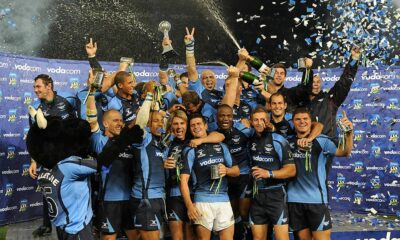
 International Rugby1 day ago
International Rugby1 day agoSuper Rugby Pacific: South African rugby is bigger without you
-
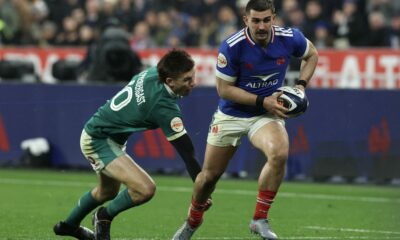
 International Rugby5 days ago
International Rugby5 days agoHow transformed France tortured inept Ireland in Paris
-
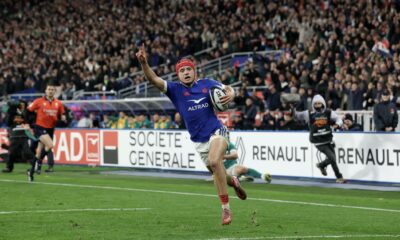
 International Rugby7 days ago
International Rugby7 days agoFiery French applauded as alarm bells ring for Ireland
-
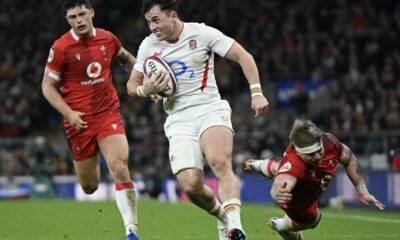
 International Rugby5 days ago
International Rugby5 days agoEngland hammer Wales as British media deliver brutal Six Nations verdict

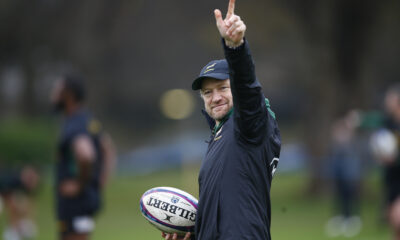



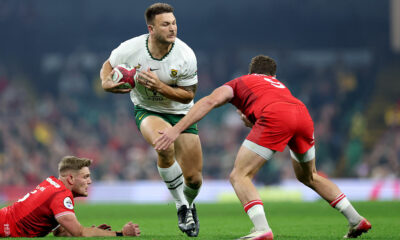

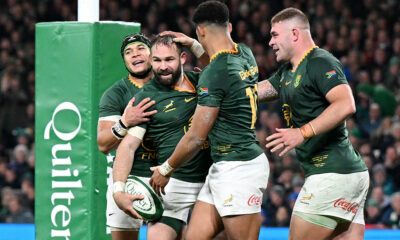



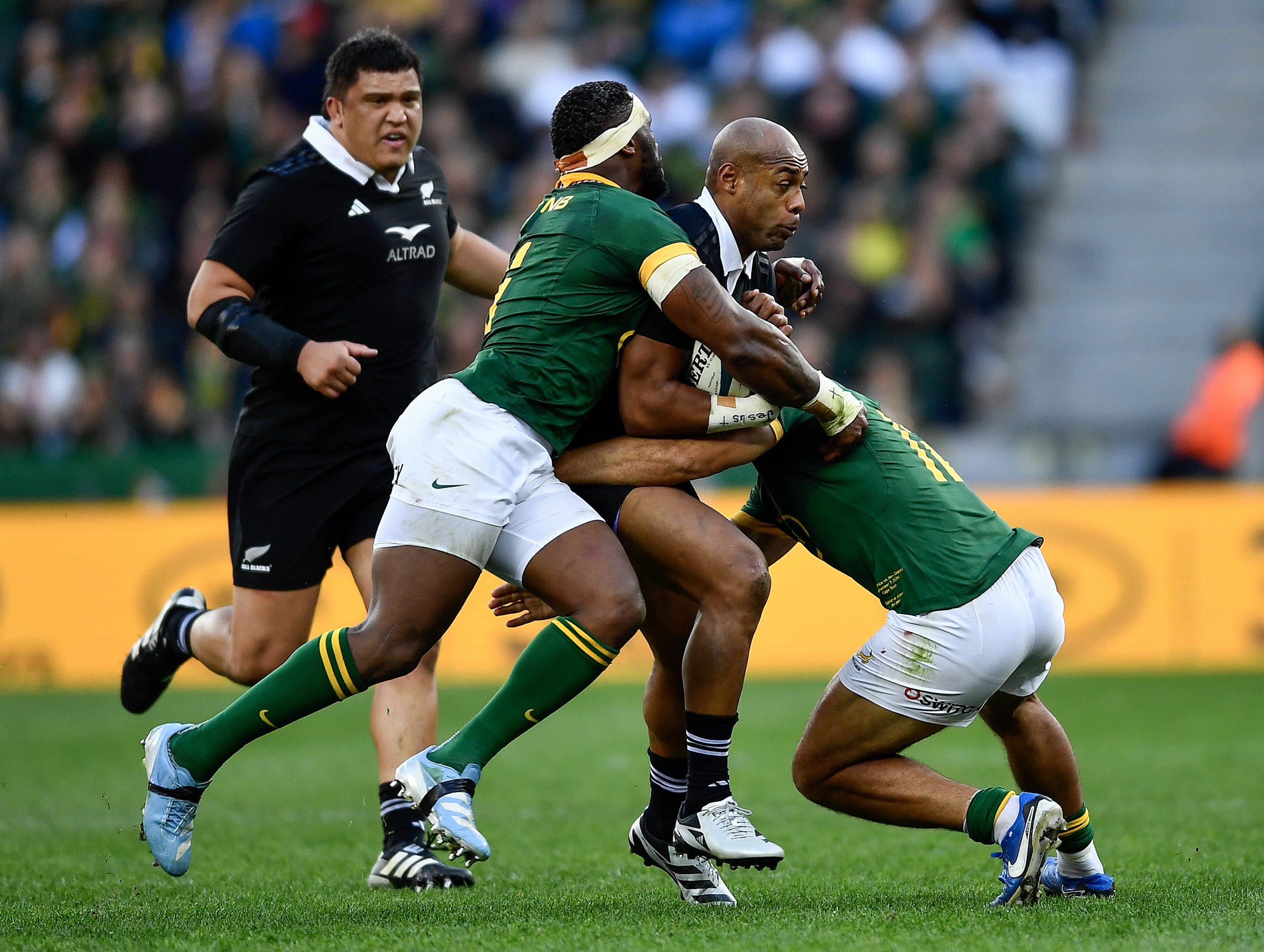
Kelvin Abrahams
2nd June 2020 at 8:26 pm
We’ve been blessed with some cracking coaches and cursed with some shambolic appointments. I think you’ve narrowed it down really well. Quick question… Do you think Carel was onto something with his team’s style of play or was he sacked at the right time? History suggests the latter to be true and Mallet himself says when he took over her had meetings (telephonic and in person) with playing personnel and they wanted something different. What he gave along with Teich was some scintillating rugga. I’m probably one of the few to value PDV higher than the general public. I may be missing something that everyone else sees.
I agree with Rassie being the right man. I thought he was one of the smartest, skilled and most honest rugby players. He has carried that into his coaching. He got to us at the right time. The Bokke and the public were desperate for what he brought so when he brought it, it was well received and well executed. He seemed to be successful wherever he went. Long may that success continue.
Internationally you’ve summed the coaching talents and contributions up well. Rod McQueen was good wasn’t he. Very good. Vern Cotter made the Scotts an awesome team to watch. Pleasing on the eye. Then of course there are a host of NZ coaches that put their hand up. I’m looking forward to seeing what Dave Rennie does with Aus.
Gats is definitely the man. I’m a fan. I won’t be for the 2021 Lions tour but as it stands I enjoy what his teams bring to the field.
I never liked the Loftus crowd. I lived in Pretoria for a few years and had to venture there with my Province jersey and flag. It almost never ended well. King’s Park was similar. Perhaps I was the problem! I really like Newlands. Can’t believe I’ve never watched a game at Ellis Park! What a shame! On my “to do list”. I never watched enough games as an adult in Bloem to judge it. Watched a few after being thumped by Grey Bloem as a schoolboy.
I reckon I could watch the Boks on a cabbage patch so I won’t argue with Loftus. One thing about the Pretoria crowd, they get behind the Boks!
Internationally I got to Cardiff Arms Park and Murrayfield. The only crowd that can rival the singing of the Welsh anthem would be the French crowd singing “La Marseillaise” at Parc des Princes (based on what I saw on TV) so again I won’t argue there. Funny how my father also built up the expectation of Arms Park for me, only his experiences were from radio broadcasts and later on TV.
I have no refs I like, just many I dislike! ???? Jokes… Nigel Owens and Kaps are cool. Derek Bevan called a good game back in the day. You sure you don’t want Tappe Henning in the mix? I’ll never forget Bob Skinstad saying, “Tappe you lied to me…But Tappe you lied!” Priceless.
Cheers Mark. Spot on selections here.
Dr Rugby
2nd June 2020 at 10:02 pm
Keo, I do not agree with your “Jake White rebuilt the Boks” statement. Os, Smit, Victor, Bakkies, Schalk, Juan and a few backs were all from the Streauli era. Only Spies, Habana and JP were new Boks.
On the Mallet/Skinstad issue the following: the Boks reached the semi without Gary. Our quarter final hero (Jannie) missed 18 points with the boot in the semi. That cost us a place in the final even without Gary in the group.
Dr Rugby
2nd June 2020 at 10:22 pm
Kelvin, I was fortunate to watch rugby at all SA’s big stadiums. Most of the Loftus crowd do not know their rugby. I mostly sat in the blue balcony with refs and former players! At Ellispark some individuals were very aggressive. Kingspark and Bloem were fairly decent, but I also prefer Newlands . Go well.
Kelvin Abrahams
2nd June 2020 at 10:37 pm
Doc, what’s up with all the aggression at some of the stadiums. Crazy. I remember watching Stormers vs Waratahs at Newlands in 2008. Worst rain at a ground since WC95 semi vs France. I was in my Stormers jersey and I had a mate, Cobus, in his Bok jersey. The biggest ou at the bar says to my mate, “Jy’s by die verkerde game. Dis Stormers nie Bokke nie”, Cobus replies “Eks eintlik a Blou Bul onderstener”. The guy puts his beer down and says “V*k! Dan laat ek jou blou moer!” ? ? ? before Cobus collapsed in panic the guy laughed his head off and we all enjoyed beers and laughter “to warm up” in the cold.
Keo
3rd June 2020 at 12:22 pm
Dr Rugby, Jake picked only 12 of Straeuli’s World Cup squad of 2003 in his first squad selection of 30 players in 2004. I’d say that is a rebuild. When I say he rebuilt: He reintroduced Monty to the Boks in 2004. Straeuli never picked Monty. Jake brought Os out of retirement. Straeuli never played him. Schalk played two matches at the 2003 RWC under Straeuli. John Smit made his debut in 2000 under Mallet, but got injured for 2002 and played only a handful of matches in 2003. Jake made him his captain and built his forwards around a front row of Os, Gurthro Steenkamp and CJ van der Linde. He picked Spies, picked Fourie du Preez and Ricky Januarie as his two scrumhalves (neither was a first choice for Staeuli), he picked Jean de Villiers who Straeuli left out of the original 2003 RWC squad, picked JP Pietersen and Bryan Habana. To make my point: Straeuli’s starting XV in his final Test, the 29-9 RWC 2003 q/final defeat against NZ read: South Africa: J van der Westhuizen, A Willemse, J Muller, D-W Barry, T Delport, D Hougaard, J van der Westhuizen; C Bezuidenhout, J Smit, F Rautenbach, B Botha, V Matfield, C Krige (capt), D Rossouw, J Smith. And in 2004, six months later, Jake’s starting XV v Ireland in Bloemfontein: read: G du Toit; B Paulse; M Joubert, W Julies, H Mentz; J van der Westhuyzen, F du Preez; O du Randt, J Smit, capt, E Andrews, B Botha, V Matfield, S Burger, P Wannenburg, J Cronje.
Only Smit, Bakkies, Matfield & Jaco vd Westhuizen initially made Jake’s starting XV. Juan Smith reintroduced for the Tri Nations, Monty, Joe van Niekerk, etc a bit later in 2004. Bakkies, Victor and Smitty, in 2004 had less than 30 Tests combined. From 2004 to 2007 was very much a Jake White Bok build.
Keo
3rd June 2020 at 12:29 pm
Also Dr Rugby, Jannie de Beer kicked one from four drop goal attempts in the semi-final and scored all 18 points with that one drop goal and five penalties. The drop goals that he missed were all more hit and hope than easy misses. His 80th minute penalty kick with the last strike of normal time, to take the match into extra time, was one of the greatest kicks I’ve experienced. I don’t know if you were at Twickenham that day, but I was and it was still the old Twickenham, with the stands behind the posts not closed up, so the wind swirls and De Beer was kicking into a gusting and swirling wind. De Beer’s boot was one of the reasons we got into extra time. In extra tine he added a sixth penalty for the Boks to take a 21-18 lead. Thereafter Matt Burke kicked his seventh penalty, Larkham added that freakishly brilliant 48 metres drop to make it 24-21 and in the last two minutes of added time, Burke put the Aussies out of a three point range with his eighth penalty.
Dr Rugby
3rd June 2020 at 9:08 pm
Mark, you schooled me again, and that is why I am a big fan of yours because of your rugby knowledge. Let’s pretend Jannie kicked those dropgoals then Mallet was right by not picking Gary Teich, cause we would be in the final without Gary even playing a game.
Dr Rugby
3rd June 2020 at 9:18 pm
Mark, Jake White only had four of the 38 Springboks that became internationals under him in his starting line-up for the WC-final in 2007. They were JP, Habana, Steyn and FduP. Although FduP was at staaldraad with Streauli. Eleven of the players were therefore not White’s products.
Dr Rugby
3rd June 2020 at 9:26 pm
Jake White’s four defeats in New Zealand included three scores of 30 or more points against the boks. In 2005 the boks lost 27-31, in 2006 the score was 17-35 and in 2007 it was 6-33.
Keo
8th June 2020 at 1:48 pm
Hey Dr Rugby. Thanks for sharing your thoughts.
Keep on reading and interacting.
tlovertonet
30th January 2026 at 10:43 am
It’s in point of fact a great and useful piece of information. I am glad that you shared this helpful info with us. Please stay us informed like this. Thank you for sharing.
fdertol mrtokev
10th February 2026 at 4:52 am
You are a very smart individual!